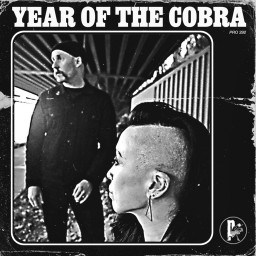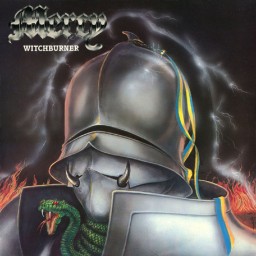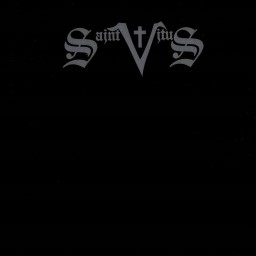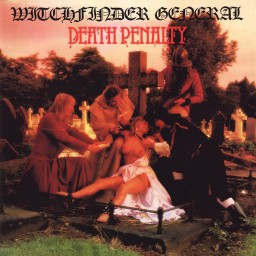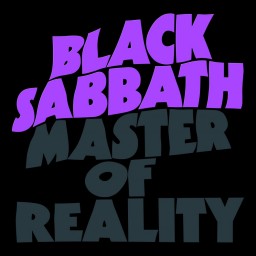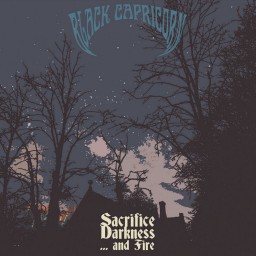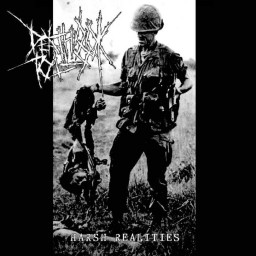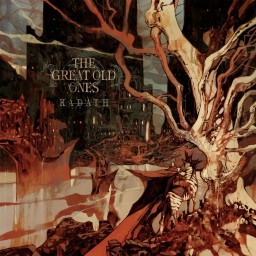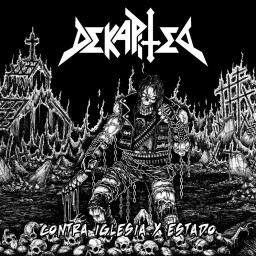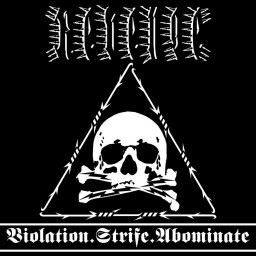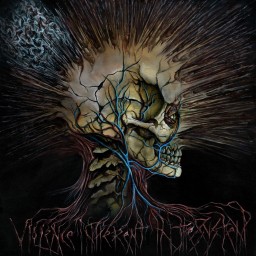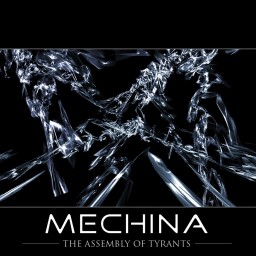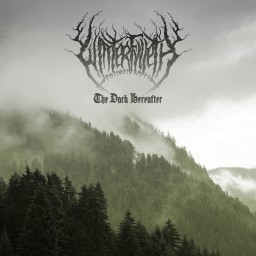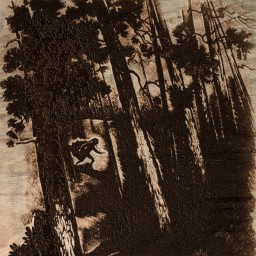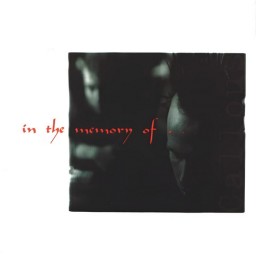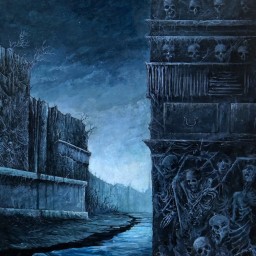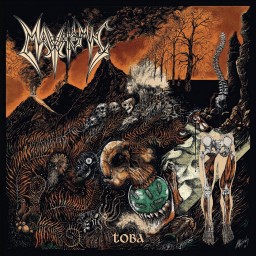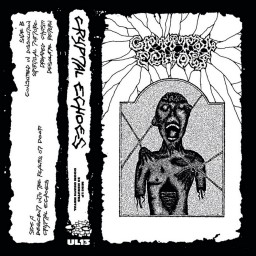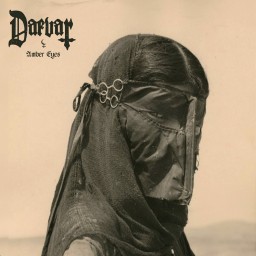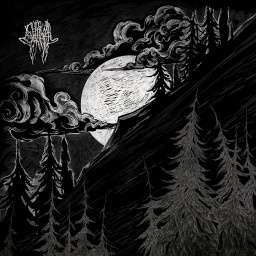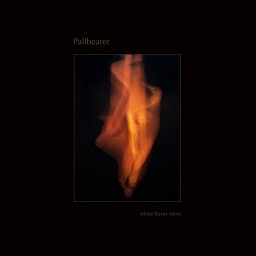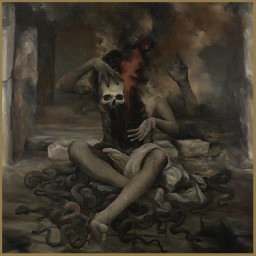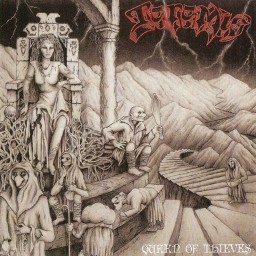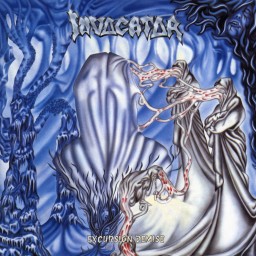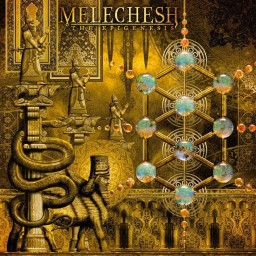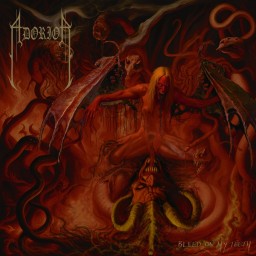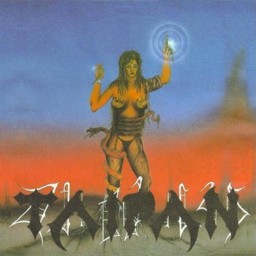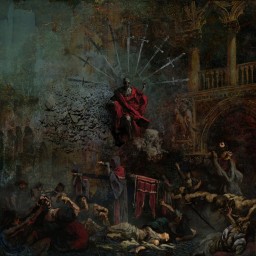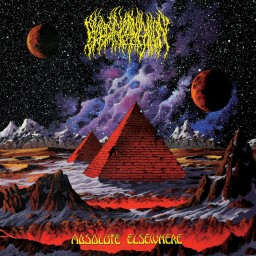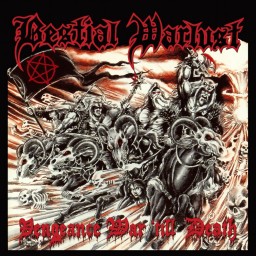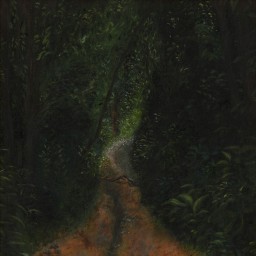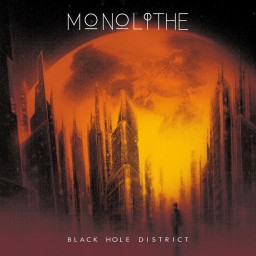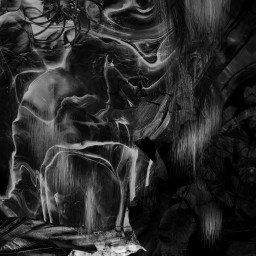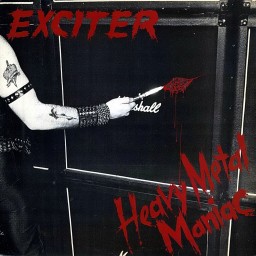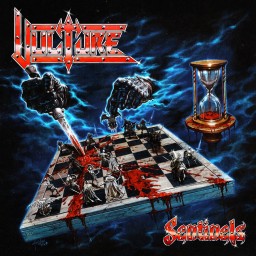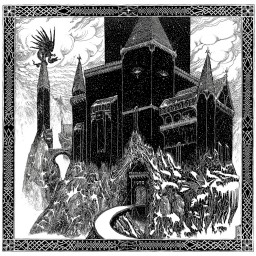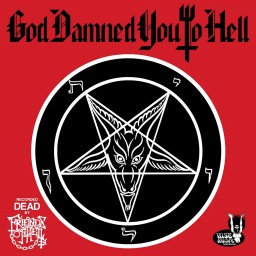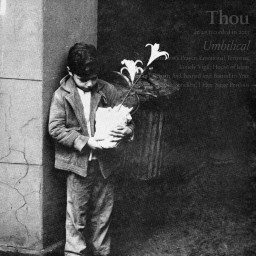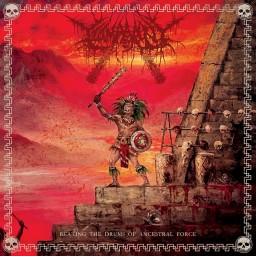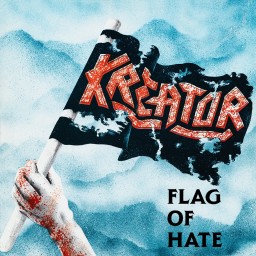Sonny's Reviews
As I have said elsewhere, I am quite the fan of the Seattle husband and wife team that are Year of the Cobra, them first catching my ear with their "The Black Sun" EP back in 2015. I have, however, been a bit tardy getting across their latest release, this self-titled full-length being released over a month ago now. YotC play stoner metal with a doomy vibe and a bit of a psychedelic influence. Comprising vocalist and bassist Amy Tung Barrysmith and drummer husband Jon, the pair deliver their stoned-out doomy vibes without the use of six-stringed guitars. The riffs are carried solely by Amy's basslines as are any solo embellishments.
This S/T kicks off with the lead-off single, "Full Sails" which thunders straight out of the blocks with Amy's lumbering and forceful bassline which is then joined by Jon's bludgeoning drums and a second bass riff. As Amy's vocals join the fray we find that not a distant-sounding, shrinking violet, but a strong and powerful version of the ethereal-voiced siren trope that is common within doom metal, sitting somewhere between Windhand's Dorthia Cottrell and Jefferson Airplane's Grace Slick ("White Rabbit" version, not "We Built This City"). This is followed by the more uptempo "War Drop" which is a groovier and more catchy example of the band's sound with a chorus that will keep bouncing around in your head well after the track has finished, despite the ominousness that it portends. By this time you find that you aren't really noticing the lack of six-string riffing, such is the force of the basslines, which not only stands as testament to the duo themselves, but also to producer Matt Bayles who owns and operates Seattle's Red Room Studio and is a veteran producer of bands such as Isis and Mastodon and does a fantastic job here.
"Daemonium" and its uncomfortable lyrics of confrontation of a violent sex offender, is another pounding, pulsing uptempo effort which has an almost punky feel to it and carries forward the momentum generated by "War Drop" into the heart of the album. I have to confess that, despite my evident preference for doom metal, here Year of the Cobra sound much more effective on the quicker-paced material than on the slower stuff. "Alone", which follows "Daemonium", doesn't quite strike the same chord as the previous tracks and feels amost aimless compared to the succinct and driving nature of the early part of the album. "7 Years" picks up pace once more and is another fist-pumping, psych-heavy, stoner workout with a catchy chorus. "The Darkness" is possibly the most interesting track on the album, with it's crawling, serpentine opening bassline enveloping the listener and tightening its coils as Amy turns in a nicely varied vocal performance that positions her well to the top of the list of female doom metal vocalists.
I think it is fair to say that the Seattle duo, despite sitting firmly in the stoner doom camp, have, wittingly or not, picked up some influence from their home city's historical assosciation with grunge and this is nowhere more apparent than on "Sleep" which feels like a downbeat, stonerised version of an Alice in Chains or Soundgarden track. Closing out the album is its longest track, "Prayer" which is a very laid-back sort of track and, to be honest, I found it ended the album on a bit of a low-energy downer that was at odds with the majority of the material on offer and may well send the casual listener away with a slightly distorted memory of what had gone before.
I think it is fair to say that Year of the Cobra inhabit a fairly unique area of stonerdom, with a grungy, punkish attitude to stoner metal that sees them writing some exceedingly groovy and catchy material, whilst still delivering with powerful, bass-heavy thunder some seriously downtuned and fuzz-laden psyched-out trips. I have never seen them perform live, but I suspect they may be one of those bands that attract a quite diverse following. I have not completely made my mind up yet where this S/T ranks in their discography, but it is certainly their most accessible I would suggest and could well see them really start to gain a foothold in the wider world.
Genres: Stoner Metal
Format: Album
Year: 2025
Sweden's Mercy are best known for being fronted by a pre-Candlemass Messiah Marcolin, especially as they struggled after he left, eventually splitting up in 1988. This, however, is a bit unfair on the rest of the guys because Witchburner is actually a very cool early doom metal record. It still retained a significant amount of heavy metal DNA, much like most mid-80's doom acts, except maybe Saint Vitus. It kicks off very strongly with the head-turningly-titled "I'm Your Pervert Priest" which possesses a crawling and portentously doomy riff which is topped off by Messiah's instantly recognisable vocals and marks the first time that a genuinely gifted and expressive vocalist was featured on a doom metal track, providing ample proof why Leif Edling wanted Messiah to join Candlemass after Johan Langquist refused to commit beyond the recording of "Epicus Doomicus Metallicus". What may surprise Candlemass fans is that Messiah was only seventeen at the time of recording and also played drums on "Witchburner"putting in a decent shift behind the kit, being basic, but effective. Lyrically, the track is obviously mocking of established religion, a theme that became well-established within metal circles, here given a sardonic and humorous slant rather than the out-and-out vitriolic attacks that became de rigeur within metal lyricist circles.
At this time Mercy had been reduced to a trio with three of the five that recorded the S/T debut having departed before the recording of "Witchburner" and remaining members Messiah and guitarist Andrija Veljaca being joined by second guitarist Jörgen Horst who also handled bass duties on the new record. The guitar sound on Witchburner is based on the "Tony Iommi" sound, but has a bit more of the grittiness of Saint Vitus' filthier intonation than heard on albums like Trouble's S/T or any of Sabbath's material. Where it does have more in common with these is in the songwriting, the slow, doomy material still being countered by a fair bit of traditional metal riffing, although that filthier, distortion-heavy guitar sound makes the faster riffs sound great. This was actually Mercy's sophomore full-length and I find it inconceivable that they hadn't received any exposure to the more doomy acts emerging, particularly from the US, between the recording of their 1984 debut and this because the two are worlds apart. The S/T takes its cues from the NWOBHM with the band coming off like a swedish version of Saxon for the most part, but "Witchburner" was much darker-sounding and had shed all the hard rock influences of the earlier record, becoming a much heavier album as a result.
The riffs are pretty memorable and Messiah's enunciation is excellent as usual, making "Witchburner" one of those albums that sticks around in the old grey matter and that people may find you singing along with later. The two guitarists are also impressive with some terrific soloing, the incendiary and blistering fretwork of the solo at the midpoint of Pain of Golgata, is just one example of a solo that would be salivated over had it come from KK Downing or his like and here provides a searing contrast to the plodding dirge of the main riff.
Whilst the three tracks of side one are undoubtedly the doomier and for me personally the better, the second side also has it's moments and is interesting for different reasons. The opener on side two, "Welcome to My Graveyard" is virtually speed metal and with that filthy guitar sound it actually sounds really good, so if you have always wondered what Messiah would sound like singing in a speed metal crew then here is your chance to find out. After that, "Judgement Day" has a bouncy "Children of the Grave" riff and may be the "catchiest" track on the album - all together now, "No one gets away... on Judgement Day". The penultimate track "Voodoo Kills" is for my money the weakest here being a little all over the place and not terribly well put together, but it is still listenable enough all the same. Closing out with the eight-minute title track, the ponderous ominousness of side one makes a welcome return and we are thrust into the doom-laden world of seventeenth century religious zealotry and witch huntings which was destined to become pretty standard doom metal lyrical fare.
All-in-all I think this is actually a very good example of early traditional doom metal which deserves far more attention than it has received. I would take this over Trouble's "Psalm 9", for example, which may or may not be a hot take, but is my heartfelt opinion as I think this sits much nearer to the Saint Vitus debut than to Trouble's and I would hold SV's self-titled up as the flagbearer for early trad doom. Sure this does step into trad metal and even speed metal territory occasionally, but the doominess of the three tracks on side one and the closing title track are ample proof that these Swedes were committed to playing and exploring doom metal further. It is a shame that we never really heard much more from Mercy, but as I said they struggled after Messiah left and their later output doesn't live up to this earlier promise with 1989's King Doom being a major disappointment. So, as it stands, "Witchburner" is an interesting development in the european take on doom metal and allows us to glimpse the early career of one of doom metal's iconic vocalists, making it a worthwhile listen which should be of interest to any serious student of doom metal and its history.
Genres: Doom Metal Heavy Metal
Format: Album
Year: 1985
The mid-1980s finally bore witness to the dawn of the doom age. The proto-doom metal of acts influenced by Black Sabbath, such as Witchfinder General, was finally usurped by "true" doom metal from the likes of Trouble, Pentagram and the subjects of this review, Saint Vitus. Forming in 1978 as Tyrant, the band released a demo tape in 1979 which was mostly comprised of tracks that would eventually surface on their first two albums. They changed name in 1981, the new monicker inspired by the Black Sabbath track, "St. Vitus Dance", from the Volume 4 album. Saint Vitus originally found little favour with metalheads as their slower, downtuned style was at odds with the burgeoning speed, thrash and power metal scenes, seeing the band struggling to find a recording deal. Until, that is, they caught the attention of Black Flag's Greg Ginn who signed them to his SST label just because they were so at odds with what was popular in metal at the time. This association finally led to the release of the band's self-titled debut in February of 1984, making it one of the very first official "genuine" doom metal albums.
For a band that struggled to gain acceptance, the band membership remained remarkably stable in the early years. The quartet of guitarist Dave Chandler, vocalist Scott Reagers, drummer Armando Acosta and bassist Mark Adams who recorded that demo all the way back in 1979, was the same lineup responsible for the debut full-length five years later. Possibly due to their involvement with the hardcore punk scene, Saint Vitus have never really gone in for sprawling albums, keeping their full-length albums quite concise, with the S/T's five tracks weighing in at just 35 minutes. Opening with the paciest track of the five, the eponymous "Saint Vitus", the most striking initial aspect of the band's sound is Dave Chandler's filthy, fuzzed-up and downtuned guitar that sounds like the buzzing of a horde of seriously pissed-off hornets and achieves an atmosphere of darkness that few at the time could match. Chandler is ably supported by Adams' basswork, which is as effective at deepening and strengthening the riffs as Geezer Butler's is on those early Sabbath albums, although Vitus sound way more grimy and brooding than Sabbath ever did in all honesty.
Much like Ozzy and Witchfinder General's Zeeb Parkes, Scott Reagers isn't exactly what anyone would call a technically superb vocalist with a wide range, but his reedy and slightly nasal delivery is actually a lot more robust than you would expect and is well-suited as a counterpoint to the deep and warmly resonant guitar sound with the poor fella occasionally sounding like he has lost the plot mentally. Reagers has often been given short shrift when compared to his later replacement in the band, Scott Weinrich, but as much as I love Wino's grizzled vocals, I feel Reagers' more unhinged style suits the material on this debut better. There is something about the spirit of traditional doom metal that doesn't see technically accomplished vocalists as a requirement. I don't know whether that is down to the spiritual godfathers of the genre featuring Ozzy as their front man or if it is just a preference for dark atmospheres over technical ability, but either way it is a truism and gives an opportunity to singers like Reagers to push themselves to the fore on the strength of their vocal character and knack for creating a unique atmosphere rather than on their range and technical precision.
An underappreciated aspect of Saint Vitus' early material is their ability to write memorable and almost "catchy" riffs and songs without compromising on the inherent darkness of the tracks. The riff and chorus of the eponymous opener is every bit as catchy as Witchfinder General's eponymous track, yet has a far darker vibe to it, mainly down to the filthiness of the guitar sound. A noticeable feature of this album, whether intentional or not, is that after the relatively sprightly opener, it becomes gradually more and more sluggish in tempo, with the two tracks on side two, "The Psychopath" and "Burial At Sea" having slowed to a crawl, as if the energy has been drained from the band as they spiral further and further into darkness. With those two tracks especially, Saint Vitus laid down the commandments for doom metal - play it low, play it slow and keep it dark.
In summation I would cite Saint Vitus as one of the very earliest official full-length albums where a band went all-in and committed totally to the doom metal ethos that Sabbath promised, which, it must be borne in mind, was completely at odds with the zeitgeist of playing faster than everyone else and with an increasing emphasis on technical skill and songwriting complexity. This was a bold move for the time and, in truth, it wasn't until much later that the band gained the respect and kudos they were due for the influence they exerted on a whole genre. In fact, probably on two genres, because it is entirely possible that Saint Vitus' association with Greg Ginn had an influence on the direction of Black Flag's "My War" which was released just a month after "Saint Vitus" and which was a fundamental release in the evolution of sludge metal. All this makes "Saint Vitus" an indispensable release for fans of doom metal.
Genres: Doom Metal
Format: Album
Year: 1984
Witchfinder General were formed at the onset of the NWOBHM in Stourbridge on the outskirts of England's "Second City", Birmingham. What set them apart from most of the new movement was that they took inspiration, unsurprisingly given where they hailed from, of Black Sabbath rather than the Judas Priests, Motorheads and Budgies of their contemporaries. They released a 7" single in 1981 that saw "Burning a Sinner" backed by "Satan's Children" which failed to make much of a splash and which is now incredibly rare. The following year saw the release of the three-track "Soviet Invasion" EP, which did see the band finally gaining a little traction. It contained a faux live version of "R.I.P.", recorded in the studio with crowd noise added later, at the behest of the label's head honcho, Paul Birch. This would be the track which also closed out "Death Penalty", albeit in a re-recorded and superior form.
Finally, in the autumn of 1982, Witchfinder General released their debut full-length to a mostly positive response from the UK's metalheads and the rest, as they say, is history. Grabbing the attention of every male teenage metal fan in record stores by featuring a famous Page 3 model in a churchyard and in a decided state of undress on the cover, the band then had to deliver within said album's grooves to match the hype thus generated. Fortunately, they did so and their brand of simplistic and youthful Sabbath worship saw them gain a dedicated following within the wider UK metal movement. It is actually a very slight album, its seven tracks barely managing to scrape past a thirty-minute runtime, but each minute is well spent and such is the quality that it is impossible to feel short-changed. The short runtime actually gives the material an immediacy and vitality that some later, more bloated releases just couldn't replicate.
As an aside, the band that recorded "Death Penalty" is actually a three-piece, with bassist Kevin "Toss" McCready having left after the "Soviet Invasion" recording sessions, to apparently be replaced by a guy called Woolfy Trope. In fact, the band hadn't replaced McCready by the time they went into the studio to record the album so the bass parts were supplied by guitarist Phil Cope, and the wholly fictitious Woolfy Trope was credited, with a roadie standing in as "Woolfy" for publicity photos.
I think it is actually a stretch to tag "Death Penalty" as a genuine doom metal album, it was very much a product of its time, with Sabbathian riffs run through a NWOBHM filter resulting in a version of doomy, downtuned heavy metal which does nevertheless provide something of a bridge between Sabbath's 70s psych influences and the grittier 80s UK metal scene with a DIY sensibility resulting from the influence of late 70s punk rock on the UK metal community. To this end I think it is fair to say that "Death Penalty" isn't exactly a lesson in complex songwriting or technical adroitness, but it is chock full of cool and memorable riffs and has a singular personality with a street-level perspective that sets it apart from the crowd. Most of the tracks are mid-paced affairs, with only the title track and, to a lesser extent, "Burning A Sinner" slowing to doom metal pacing, but the downtuned riffs pioneered by Tony Iommi are most definitely present and it is a truth that the earliest traditional doom metal bands very often switched it up to classic heavy metal velocity. Phil's soloing is also a product of intense study of Tony Iommi's technique, sometimes piling note upon note in a fretboard firestorm, as per the opening of "No Stayer" or soaring sky high like the solo at the end of the title track. Drummer Graham Ditchfield channels Bill Ward's blunt style, but I think it is also evident that he doesn't have the technical skill level that the often under-estimated Sabbath drummer possessed, although it still works very well in the context of this album. Then there is Stourbridge's answer to Ozzy in Zeeb Parkes who, like Ozzy, isn't technically a great singer, but who imbues his vocals with such personality that it is easy to forgive him his shortcomings and just go along for the ride. The production is a bit muzzy with a fair degree of echo, as opposed to Sabbath's much more professionally produced efforts where, presumably, much more money was thrown at them, but I think this actually works in Witchfinder General's favour, giving them more of an underground vibe.
Despite the band name and the imagery of the album cover, they aren't so much a horror / satanically-themed band, often with much more prosaic and down-to-earth lyrical themes such as drug-taking, drinking and fucking taking their place alongside the witch hunting of "Witchfinder General" or "Burning A Sinner". As a very young man from a strong working class background at the time of this album's release, these lyrics espousing a love of hokey horror movies, getting hammered and trying to get off at weekends absolutely captured the essence of life for me at the time. I know I may have a severe case of rose-tinted spectacles when it comes to "Death Penalty" and others may well scratch their heads in bemusement at my fanatical advocacy for it, but simple fact is that this is an album I still spin regularly to this day, forty-plus years later and every time I enjoy it immensely, so what more could I possibly want from a record?
Genres: Doom Metal Heavy Metal
Format: Album
Year: 1982
Of all their albums "Master of Reality" is the Black Sabbath album that has grown most in stature over the years in my mind. I got into the band around 1976 via "Paranoid" and that was my go-to Sabbath album for many years, alongside "Sabbath Bloody Sabbath", "Sabotage" and the debut, with "Master of Reality" and "Volume 4" taking up supporting roles. The track which kept drawing me back to "MoR" over the years, though, was the masterful closer "Into the Void" which still stands as my favourite Sabbath track of all and is one of their more doomy offerings, it signposting me down the road of future doom metal appreciation. As time has passed and I have become more and more of a doomhead, I have acquired greater appreciation of the doomier material of "Master of Reality" and it now stands as my ultimate Sabs release, despite stiff competition.
Tony Iommi's guitar tone on this third album is perfect, its deep and resonant fuzziness pitches perfectly what would become the signature sound of future acts like Saint Vitus, Pentagram and Electric Wizard, bolstered and boosted by the brilliant and often busy basswork of Geezer Butler, an aspect of Sabbath's sound that is not always given the credit it deserves. Bill Ward's jazz-influenced drumming style takes a more blunt and bludgeoning approach here than maybe it does on some Sabbath albums, although the way his runs switch from side to side on "Children of the Grave" (best experienced through headphones) is a brilliant bit of production work and adds a little something extra to an already brilliant track. Then, of course, there is the irrepressible Ozzy Osbourne whose influence on doom metal vocalists mustn't be underestimated as he showed that you don't need to be an especially technically gifted singer to be effective, as long as you are committed and have a degree of charisma. With rock music being newly dominated at the time by the Robert Plants and Ian Gillans of the world and their ridiculous vocal range, Ozzy stood tall and proclaimed himself their equal, on sheer strength of personality alone.
Then there are the riffs. I have said it before and I will say it again, Tony Iommi can write better riffs in his sleep than all but a select few metal songwriters can ever hope to come up with, having penned some of the most iconic riffs in the history of metal. From the crawling, weed smoke-drenched, oozing of Sweet Leaf, via the choppy, romping "Children of the Grave" and the plodding grooviness of "Lord of this World", to the ponderous lumbering of the opening to Into the Void, where Geezer follows Tony's riff for added gravitas, this is metal riff heaven, with these riffs sowing the seeds of inspiration for so many aspiring doom metal riff writers of years to come. Sure, the stoner element may be fairly prevalent here, but it is difficult to imagine a "Born Too Late", "Dopethrone" or "Forest of Equilibrium" existing as we know them without this album.
"Master of Reality" isn't all just about thundering, fuzz-drenched riffing however, with the album including several moments of quieter reflection, whether it be the soothing acoustic guitar of "Orchid" or the gentle reflectiveness and soul-searching of the psychedelic-sounding and melancholic "Solitude", which thematically, if not musically, also unwittingly helps set the aesthetic for doom metal's future melancholy side. Then there is the track which always baffled me after the dark lyricism and hints at satanic influence of the band's earlier material, the pro-religious "After Forever", which is a bit of a curveball lyrically and stylistically, having a much more upbeat riff and feeling than the rest of the album. The track has grown on me somewhat over the years, but if the album had to lose one, then this would be my choice.
So there we have it, for my money "Master of Reality" is one of the great metal albums, being an influence for both stoner and doom metal and perfecting a guitar sound that still stands tall to this day, over fifty years later, as a signature sound in the metal world.
Genres: Heavy Metal Stoner Metal
Format: Album
Year: 1971
Italy's Black Capricorn are a band I have been following for some time now, going back to their 2014 "Cult of Black Friars" album. I have always found them to be consistent, if not exactly earth-shattering, exponents of stonerised traditional doom metal and this latest album, their sixth, continues that direction of travel. The downside with this is that a band producing material which all ploughs essentially the same furrow, will inevitably encounter the problem of diminishing returns at some point. I think, even for me, that tipping point has finally been reached with "Sacrifice Darkness... and Fire". I don't like admitting this, because this isn't a poor album by any stretch, but neither is it particularly amazing. In truth, it feels a bit lacklustre, especially during the first half, with the vocal performance in particular coming over as weak. I know, stoner doom isn't exactly renowned for exceptional vocal talent, but the singing here feels uninspiring and tired and otherwise decent tracks "Blood of Evil" and closer "A New Day Rising" are a bit painful as vocalist and guitarist Fabrizio Monni struggles with the higher registers.
Instrumentally there are some damn good riffs, delivered with the usual hypnotic, psych-inspired repetition that is par for the course and, in truth, when the band get into a trippy stoner groove then that is when I am at my happiest with the album. The guitar tone is generally very nice with a warm, fuzzily distorted sound that encapsulates the stoner doom ethos nicely. Unfortunately the solos are another aspect that just feel lacking here. Take a track like "The Night That Came to Take You Away", which has a couple of pretty good riffs, but the solo in the latter part of the track is just so weak and uninspired that, along with the vocals, it almost undoes the good work done by the riffing. Conceptually and lyrically we are in the usual Roger Corman / Hammer Horror world of hokey horror stories which, again, is pretty much par for the course and is entirely what we have come to expect, so neither helps nor hinders appreciation of the album for the band's usual fans.
Songwriting-wise, things are kept pretty simple with straightforward song structures, competently delivered in the main, ultimately giving us an album where the riffs do the heavy lifting and are the focal point. Luckily these are of sufficient quality to make the album a worthwhile listen, but, that said, I don't think it is of high enough overall quality to maintain too much lasting appeal.
Genres: Doom Metal
Format: Album
Year: 2024
As much as I enjoy the odd brutality injection of a good grindcore album, I cannot claim to be any kind of authority on the sub-genre. As such, Finland's Death Toll 80k were unknown to me prior to this, their debut full-length, crossing my path well over a decade after its release. Well, the four-piece certainly seem to know what they are about with this ticking all the boxes of what I want from a grindcore album. Cramming twenty-three tracks into its mere 25 minutes runtime, this is a relentless succession of short volleys of musical violence and aggression designed to have a cumulative effect upon the listener. Each track crashes into the previous one with barely a breath in between, that sees each new adrenaline surge adding to the wave created by the bloody rampage preceeding it, so that come album's end the listener is energised and invigorated by sheer biochemical energy alone. This does not imply, by any means, that all the tracks sound the same. There is a decent variety of riffs within the short run time, whether it be the hulking death metal blast of a track like "Taught To Consume" or the thrashy groove of "Empty Pose" there is enough variation to prevent any accusations of stagnancy, but of course this is all within the context of a grindcore album, so don't go in expecting too much light and shade or any degree of compositional complexity as you will be sorely disappointed.
Vocalist Oula Kerkelä is OK, let's say. He certainly isn't a Barney Greenaway and I would have to admit that his vocals sound very much the same all the way through with little nuance or inflection. Be it his guttural grunts or ragged screams, each sounds much like the previous ones, the only real variety being the proportion of one compared to the other during each track. This isn't deal-breaking really as his delivery is more than aggressive enough to convey the violent anger essential to the aesthetics of grindcore, but it is an aspect of the band's sound that could perhaps be better. Drummer Jori Sara-aho is also very much at the centre of things and his skinwork is technically capable and precise, often achieving blistering blastbeat speeds without any sign of faltering and delivering reasonably interesting fills when required. Guitar-wise it is all about riffs with no real soloing present, not even in short bursts. No, this is pretty much "just" a riff upon riff pile-up. Luckily, the riffs are great with a decent memorability factor and are tightly executed so pretty much hit the spot every time.
Overall I have to admit to being quite impressed by "Harsh Realities" and, vocal shortcomings aside, this is a top-drawer grindcore release that I am surprised hasn't gained a higher profile as it is capable of going toe-to-toe with all but the absolute best the genre has to offer.
Genres: Grindcore
Format: Album
Year: 2011
I have been a big fan of the Lovecraft-obsessed Frenchmen since the release of their sophomore, Tekeli-li, back in 2014. They have always imbued their atmospheric black metal with post-metal and even atmo-sludge elements to add an additional emotional redolence to their tales of eldritch horror. Whilst this latest follows a similar template, the band are also moving in a generally more progressive direction, as exemplified by the ten-minute opener, "Me, the Dreamer" and even more pertinently by the lengthy instrumental "Leng". "Me, the Dreamer" begins in TGOO's recognisably dense atmospheric black metal style, but at midpoint it takes an even more menacing turn, introducing an air of dissonance that sees it covering similar territory to that heard recently on Ulcerate's "Cutting the Throat of God", before making a more triumphal-sounding procession to song's end. The fifteen minutes of "Leng" exhibits even more musical turns, being an epic piece that expresses the faded grandeur and looming menace of long-forgotten and abandoned alien cityscapes better than any amount of words could. This track in particular, without it's reliance on the human voice, reveals how adept the band are becoming at writing metal that can convey atmosphere and mood by instrumentation alone and is a seminal piece for the band. The three guitarists weave in and out of each other with wistful and lighter motifs alongside hulking and towering, darker riffs making this a beautifully constructed and expressive instrumental.
Not only on those two tracks, but throughout it's hour-long runtime, Kadath sounds more ambitious than the band's previous material and feels like a band stretching their wings, having grown more confident in their technical abilities and reaching for more tools to utilise in their quest to produce music that fully conveys the dark and ominous concepts of the Cthulhu Mythos around which they base their ethos. They have always produced epic-sounding black metal, but their new-found confidence in their ability to expand their sound has taken this to a new level, with increasingly light and dark shades contrasting each other to deepen the otherworldly atmospherics. This isn't by any means a sea-change in the frenchmen's sound, but rather an evolution in the way they express themselves, I guess in a similar way that Enslaved successfully managed on their releases during the 2000s. Like the Norwegians TGOO are unafraid to sometimes take a slightly more melodic route with several of their riffs proving to be decidedly hooky, the opening riff of "Under the Sign of Koth" for example, being a particular foot-tapper.
All this has not come at the expense of any inate heaviness, it must be pointed out. Well, maybe a little, but I think that the more reflective moments often serve to throw the heavier sections into even sharper relief and render them consequently more effective. Look, Kadath is not exactly the kind of album you would put on to work out some aggression or for a good headbanging session, but that doesn't mean that it can't shake the foundations occasionally and it possesses enough sonic gut-punches to appeal to any number of discerning metalheads. But that ultimately isn't the aim of the album, it is for reflection and contemplation of the unknown corners of the human psyche and the barely concealed horrors lurking therein, to which end it is reasonably successful, I would suggest.
Genres: Black Metal Post-Metal
Format: Album
Year: 2025
Dekapited are a four-piece thrash band from Santiago, Chile who formed in 2006. This 2011 EP marked the band's debut release, following on from three demos, one from each of the preceeding three years. The EP features five tracks and an intro with a 21 minute runtime. I have constantly been heard espousing the merits of chilean thrash metal and these guys are deservedly one of the beneficiaries of my effusive praise over the past few years.
Taking their cues from deathly thrashers of the late 80s and early 90s such as Demolition Hammer, Dekapited tread a path that will be familiar to anyone who has any knowledge of the 21st century South America thrash scene, especially as it manifests in the chilean capital and it's surrounding areas. This small area has kept the thrash metal flag flying through what has been a lean time for the genre by incorporating aspects of extreme metal, usually black or, as is in Dekapited's case, death metal. This is nothing new of course, but I believe that because there is an actual vibrant and lively thrash scene centred around Santiago and Valpairiso, then the bands, including Dekapited, who are part of that scene, feed off each other and consequently produce metal that sounds more vital and energetic than the thrash that is being produced by more isolated practitioners. It is no coincidence that a lot of the metal world's greatest material has come from clearly defined scenes, such as the NWOBHM, the Bay Area thrashers, Florida death metal and the scandinavian black metal scenes. There is a fair bit of cross-pollination in the chilean scene with many musicians being members of several bands concurrently, allowing a flow of ideas between these bands, but an integrated scene also sees bands pushing each other to new heights as each tries to outdo their peers, which can only be good news for the fans.
Dekapited play at an almost unrelentingly quick pace. This is energetic stuff that is meant to get fans moving and feed those mosh pits with hurtling bodies. The riffs are the stuff of the classic Bay Area thrashers, loaded with hooks aplenty and being memorable enough to remain in your head long after the EP has ended. It is almost impossible to listen to this as a thrash metal fan and not to feel your head starting to nod along with most of those riffs. The guitar solos are fairly noteworthy, being more expansive than the Kerry King-derived howls that so many of the more extreme thrash acts aspire to, being more in keeping with a classic metal style of soloing. They aren't exactly birthed in neoclassical metal, but they are a bit more imaginative than the short-sharp shock of the more usual Slayerisms.
The rhythm section is decidedly capable and underpin the riffs admirably, drummer Raul Guevara displaying the chops to maintain such a high velocity assault with power and precision. He may not indulge in a lot of the fancy fills that some of his contemporaries flourish, but his is a very solid performance. Bassist Alonso Friend likewise does a great job providing a rumbling foundation for the two guitarists to perform their six-string acrobatics. A trait which is peculiar to the chilean scene specifically is for the bass to sit quite prominently in the mix, but here it is mixed much more traditionally and less conspicuously.
For me, this was a nice calling card for a pretty talented bunch of guys who could take what originally made thrash metal so great and transpose it into the modern day with just enough of an extreme metal twist to imbue it with an energy and vitality that renders it so much more relevant than a mere harking back to earlier times.
Genres: Thrash Metal
Format: EP
Year: 2011
Canada's Revenge are not a band for fucking around - they burst in, drop their war metal ordinance which is designed to cause the maximum number of aural casualties and then they get the fuck out. It isn't pretty and it isn't melodic. It is vicious and nasty and is meant to provoke a reaction of repulsion from the general record-buying public - and even the majority of metal fans I would surmise. To say that a band like Revenge only play for themselves and their fans is no hyperbole. I can't imagine them giving a shit about what anyone says about them because they make no concessions to trends, they make no attempt to expand their sound to appeal to a wider audience and they exhibit no desire to stretch themselves artistically. And you know what, I can respect that because I always appreciate those who are comfortable in their own skin and who couldn't give a toss what naysayers think or say.
Then, on the other hand there is a counter argument which says, how many Revenge albums do you actually need if they all plough exactly the same furrow? How can you get excited about a new Revenge release when it sounds so much like all the others? These are both good questions and certainly have a validity. They are charging $9.99 for the digital version on Bandcamp, $16 for a CD and from $29 for the vinyl - even the cassette version is $18, so why should you pay that much for a further rehashing of the same old sound? I am sorry, but I don't have a nice, neat answer for you and if you need to ask the question in the first place then I would have to say dont bother and look elsewhere for your musical kicks.
So what is that sound I probably don't hear you ask? It is a pulverising deathly black metal cacophony that is typical of the war metal genre. It is abrasive and unrelenting - there are no lulls in the perpetual aural bombardment, no reduction in tempo, no dropping into the odd groove-laden riff or dishing up of the occasional hook to give the brain a fragment of flotsam to hold onto in a boiling sea of blood and steel. The vocals are distorted shouts and hideous growls that often don't even seem to be issuing from human throats, shearing away even that shred of human connection from the listener. The drums batter away with a basic brutalisation of blastbeats whilst the few guitar solos just sound like somebody torturing their six-stringer into acquiescence. War metal in general and Revenge in particular produce metal that is meant to test the endurance of the listener. It is meant to be a visceral, almost physical, experience that is supposed to leave you feeling worn out and spent, it isn't deep and contemplative, or designed to make you think, unless it is about unmentionable horror and fear. This is metal that is uncompromisingly primal, raw and uncaring, so if that sounds truly awful to you then don't waste your time here - Revenge wouldn't thank you for it anyway.
Genres: Black Metal
Format: Album
Year: 2025
This is the debut album from Cleveland's Noxis and is an album of quite brutal and occasionally technical death metal. I love the guitar tone, it sounding thick and meaty with a marked weight to it. The production pushes the bass to the fore quite often, deliberately I am guessing because the basslines provide a point of emphasis in a number of places, especially early on. The playing is very tight, with an impressive crispness and precision as all three of the instrumentalists are in lockstep and never seem to lose a beat nor drop a note. And therein lies a bit of the downside for me. I am not advocating sloppy playing or messy production as such, but it is no secret that I am an old-school fanatic and I often find death metal that is very tight and precise comes off as a bit sterile to my ears. Noxis do counter that to some extent by veering towards a visceral brutality, which I often find to be a mitigating factor that can balance out overt technicality, at least to a degree. The vocals are, in the main, an aggressive and bullish, bellowing roar, which I like, but they do occasionally drop into "stuck-pig" mode, on second track "Blasphemous Mausoleum for the Wicked" for example, which is a style that is a particular bugbear of mine.
So there are a number of factors that work against Noxis, at least based on my normal taste profile. The technical shifts and flourishes, the very precise nature of the instrumentation and overly crisp production that often leaves me cold and the resorting to a vocal style I am not a fan of all suggest I am in for an unsatisfying experience. Yet, somehow Noxis manage to keep me onboard, probably due the suggestion of brutality they maintain throughout the runtime. This gets me through the early part of the album, which is where I think there is a greater concentration of the problematic elements for me, and sustains me enough to reach the second half which feels less technical and more in-your-face brutal. Then there is the crazy "Horns Echo Over Chorazim" which isn't only one of the most brutal-sounding tracks on the album, but also has a crazy solo section that seems to be performed by a large selection of wind instruments, such as oboe, saxophone and so on, each following the other to perform a single solo. Weird, yet strangely compelling.
The four tracks from "Horns..." onwards are more to my liking than the earlier parts of the album, with less emphasis on the technical aspects making the band sound freer, looser and more relatable for me at least. The title track, which follows "Horns.." is a formidable beast and sees the band hinting at an old-school desire to sound as intimidating as they can. There are still some interesting moments in this latter part of the album, the off-kilter guitar solo and especially prominent basswork in the middle section of "Emanations of the Sick" as well as the previously mentioned wind instrument solo in "Horns..." are inspirational and really stand out during these more brutal tracks, more so than I feel they would in the more overtly technical earlier material.
So, ultimately this was, for me, an album which started off OK without especially wowing me, but which kept me sufficiently engaged to persevere and find the buried gems that are the final four tracks. These are the motherlode of the album as far as I am concerned and would have made a killer EP, but as it is, this is a decent album of pseudo technical and brutal death metal with a killer final 22 minutes.
Genres: Death Metal
Format: Album
Year: 2024
So, it appears that this is Mechina's debut album, released in 2005, a year after the band formed. I understand that they later went down a more symphonic path with their industrial sound, but here they have gone for straight-up classic Nineties-era Fear Factory worship. The riffs are decent with a meaty guitar tone FF fans will feel comfortably at home with, although I don't think Mechina's riffs have the same high memorability factor as the LA legends achieved on their best material. Where they do score well though is when they use synths to add an additional, thin layer to their sound, such as during "Afterimage" or on the title track. "War Fog", which connects the two tracks, is a short, synth-driven interlude which is also quite evocative and further illustrates the band's nascent atmosphere-building prowess. Vocalist David Holch also has a creditable crack at reproducing Burton C. Bell's growling bark as the main vocal, but where he comes unstuck is with the complementary clean vocals which, in all honesty, sound terrible, as if he can't carry a tune at all. They are so bad that I can't believe no one advised the band to re-record them or get a guest in to help out.
Ultimately, for me, this is an enjoyable enough slab of Fear Factory worship, irreparably tainted by very poor clean vocals, that I am unlikely to turn to in the future unless the FF back catalogue suddenly disappears from the face of the Earth.
Genres: Industrial Metal
Format: Album
Year: 2005
The Dark Hereafter was the fifth full-length from the Mancunian black metallers and marked a slight tonal shift for the band. It also courted some controversy amongst fans, not for its musical progression, but for the fact that it had a mere forty minutes runtime and only five tracks, one of which "Pariah's Path" was already available as a bonus track on the previous The Divination of Antiquity album. The closer, "Led Astray in the Forest Dark" is a cover of Ulver's "Capitel I: I Troldskog faren vild" from their iconic Bergtatt album, so The Dark Hereafter only actually delivered three new tracks, yet at full price!
Anyway, down to the music. Side one comprised three tracks of the sweeping and melodic atmospheric black metal we were familiar with from Winterfylleth's previous output. Opening with the title track, the pummelling blastbeats tell us we are on solid ground, especially when the expansive tremolo riff sweeps us away to windblown moors where opposing warrior bands face off against each other. The lyrics of this opener and also "Ensigns of Victory" feed very much into that aesthetic with tales of Anglo-Saxon resistance against Norse invaders in Dark Age England. Along with the aforementioned "Pariah's Path" these two tracks comprise side one, their familiarity easing us fans into the album. I must, however, point out at this point that I felt something a little "off" here and decided it comes down to the production which seems to mute the higher registers of the tremolo riffs and renders the cymbals almost inaudible. It's not a big deal as such, but it is sufficient to be noticeable.
With the two tracks on side two the Mancunians depart somewhat from their usual approach. "Green Cathedral" is a much slower affair than we are used to from the band, straying into post-black metal territory, spending much of its opening five minutes building from a sparse beginning with thin synths, a clean, almost liturgical chant and a hypnotic, chiming guitar phrase into a mournful-sounding middle section with plodding drumbeats and a ringing tremolo riff accompanied by Dan Capp's harsh vocals. The final third of "Green Cathedral" sees the synths sweep in and the liturgical voices join with the harsh shrieks to provide a quite epic and melancholy climax, eventually ending with a clean-spoken eulogy to a departed soul, which I personally found to be quite haunting and affecting.
The album then closes out with the Ulver cover, "Led Astray in the Forest Dark" which is faithfully reproduced by the Mancunians as a tribute to an album that they claim was very influential on them. It has a bit more meat on its bones than the thinly-produced Bergtatt original, but otherwise it is a faithful rendering of the Ulver classic. Small quibbles aside regarding whether this is worthy of full-length album status and a niggling issue with the production, it is nevertheless an interesting release in the Winterfylleth discography and is probably worth it for "Green Cathedral" alone, although the rest is certainly up to the band's usual standards musically. Interestingly, this is the first Winterfylleth album to involve Mark Deeks and, in light of some similarities between "Green Cathedral" and some of Deeks' work under his Arð banner, I can't help but wonder if he had a big impact on the band's songwriting at this point. It may also be salient to acknowledge that the next album was the pure folk album The Hallowing of Heirdom and The Dark Hereafter may have been a case of the band clearing the decks before a new phase in their development.
Genres: Black Metal
Format: Album
Year: 2016
Wędrujący Wiatr are a polish duo comprising W. (aka Swaikstan), who is also a founder member of Sworz, and Razor (real name Tadeusz Jurzec). Both play guitar and contribute folk instrumentation with Razor performing vocals and playing drums and keyboards, whilst W. is the band's bassist.
"O turniach, jeziorach i nocnych szlakach" is black metal that is completely rooted in the natural world, its title translating as "About the Peaks, Lakes and Night Trails". From its panoramic, sweeping soundscapes with their pipe-like accompaniments to the restrained, clean-picked folk interludes and field recordings of natural sounds such as birdsong, wind and running water, this is a celebration of the Great Outdoors in all its splendour. There is a richness to the sound that gives it more solidity than the ephemeral and thin production often associated with the frostier versions of atmospheric black metal, as if to emphasise the permanence of the mountains and lakes when compared to the mere fleeting passing of seasons. The vocals contribute to this fuller sound, Razor's voice being a lower-pitched, ragged bellow rather than the harsh shriek often employed by black metal vocalists. It is still pushed down slightly in the mix to give it a more distant quality, as is common, but it retains sufficient power to bolster the depth of the overall sound.
Instrumentally, the tremolo riffs swell and recede like the mountain peaks they portray, with some gorgeous melodies that speak of the immense majesty of the natural landscape. The sound is filled out further with the incorporation of several folk instruments, particularly pipes, it appears, and with a restrained application of keyboards which gives several of the tracks, especially the opener-proper, "Wołanie z granitowych twierdz", a Celtic flavour, reminding me very much of Andy Marshall's Saor project. Razor's drumming is mostly blastbeats and cymbals, driving the tracks and adding impetus to the riffing to ensure the dynamic sweep of the tracks never flounders.
With "O turniach, jeziorach i nocnych szlakach" these Poles have turned in exactly the sort of album that hits my atmospheric black metal sweet spot, its paeons to the natural world being both uplifting and inspiring, this is black metal with a positive spirit for those who feel any kind of connection with Nature.
Genres: Black Metal
Format: Album
Year: 2016
This 1997 album appears to be the only release from the Aussie hardcore punk / metalcore outfit, which is a great shame because this was a genuine surprise and I enjoyed it massively. I don't know what "real" metalcore fans think of it because, to my ears, this sounds first and foremost like a punk album with a metallic guitar sound, which is no problem to me at all. I'm not a large consumer of metalcore, but one of my bugbears with it being that so many of the modern bands sound alike and I have real trouble telling both the bands and their songs apart. But because of the marked punk component, this has a lot more character than some of the more modern metalcore bands I have listened to. In fact I am not even sure that some of the punk component even counts as hardcore, sounding catchy and melodic, more like second wave UK punk acts like Angelic Upstarts or Anti-Nowhere League, although elsewhere they do have a Minor Threat vibe going on. One of my favourite punk albums is Suicidal Tendencies' debut (their best by a country mile) and I found that springing to mind several times whilst listening to this. I must admit I didn't even realise that Callous were a christian-themed band until reading Daniel's review but, to be honest, I don't care one way or the other because I am more interested in the abrasive timbre of the vocal performance than the actual lyrics themselves and it still sounds pissed off and angry, no matter the lyrical content. In fact, let's face it, some of the straight-edge punks could be even more preachy than any christian act are ever likely to be.
I think that ultimately "In the Memory Of..." appeals to me so much because it has a strong individuality and character due to it having such a prominent early punk influence - a trait which is often just vestigial in more modern metalcore, leaving it often sounding very samey with everyone wanting to be Converge. Sadly it seems that most genres tend towards conformity at some point - and even punk itself fell into that trap with the endless stream of cookie-cutter skate / pop punk acts that proliferated in the wake of Green Day and Bad Religion's early success. If I am going to explore metalcore further with any chance of satisfaction, then I guess these earlier days of the genre are the best place for me to start.
Genres: Metalcore
Format: Album
Year: 1997
Australia's Temple Nightside were a new one on me at the time of The Hecatomb's release, but I could tell from the off that this was going to be right up my street. I have made no secret of my love for old-school cavernous death and death doom metal and that is what these guys provide in spades. In fact they have doubled down on the cavernous atmosphere, looking to funeral doom for inspiration in layering a thick, primordial ooze over their sound. This is so funereal in atmosphere that it sounds like it is being performed by a band who have been buried alive and is seeping up through the earth into the ears of the listener. Drummer Basilysk is a member of reasonably well-known funeral doom band The Slow Death and guitarist/vocalist IV was the sole member of blackened funeral doom project Funeral Mourning, so these guys have an understanding of funeral doom that serves exceedingly well their intention to make The Hecatomb as cavernous-sounding as possible.
Taking their cues from OSDM giants like Autopsy, The Hecatomb combines classy and memorable death metal riffs (the opener Graven has an absolute killer of a main riff) with slow, ponderous doom to produce a multi-faceted attack on the listener's eardrums. Although this approach is almost as old as death metal itself, going back to the likes of Autopsy and Winter, Temple Nightside manage to make The Hecatomb a must-listen by their sheer ability to craft well-written and tightly performed doomy death metal tunes which, when married with one of the most mouldering and pestilential production jobs ever, results in an album any self-respecting OSDM metal fan should be clamouring to get their clammy, hook-clawed mitts onto. There isn't a great deal here that hasn't been done before in this field, although it does lean into funeral doom more than any of the old-school bands would have done, with sections of "Fortress of Burden and Distress" and especially closing track "Charnel Winds" really slowing it down to a crawl that is more funeral doom than its deathly incarnation. The drums are a key element to the atmosphere generated and are primal-sounding without being simplistic and sit nicely in the mix, neither too distant nor overpoweringly upfront. The abyssal and ominous atmosphere has its ante raised by three short ambient interludes, the second and longest of which, "The Murderous Victor (Commune 3.2)", features chants and tympani-like drums that hints at ritualistic exhortations and sinister whisperings of demonic forces, leading into the funereal opening of "Fortress of Burden and Distress" which continues further with these demonic whisperings.
My love of funeral doom and its influence on the sound of The Hecatomb sees it becoming one of my favourite cavernous death metal albums. Fantastic as this thick, foetid atmosphere works on the slower sections, however, I do have some reservations about its effectiveness on the faster parts, with the muddiness and echoing distortion of the production slightly blunting the onslaught of the death metal blasts when they hit, but this is a minor niggle in truth and is unlikely to be a deal breaker if this is in any way your bag.
Genres: Death Metal
Format: Album
Year: 2016
Mayhemic guitarist and vocalist Noctumbra may be better known by his real name, Javier Salgado, ex-mainman of Parkcrest, guitarist with Hellish and one of the leading lights in the chilean thrash metal scene. Unsurprisingly then, Mayhemic encapsulate the archetypical chilean thrash sound, which is typified by white-hot, hyperkinetic riffs and an influence from black and death metal. Toba marks the band's debut full-length after an EP in 2019 and a split album with Hellish in 2020. The band have undergone a number of lineup changes since they formed in 2018, with Noctumbra himself switching from drums to guitar in 2022 and only he and guitarist Doom (Nacho Pérez) remaining from the band's previous releases.
I don't think it is an exaggeration to say that chilean thrash metal is well and truly in the vanguard as the standard-bearers of the modern thrash scene. As the genre enters its fifth decade the sounds coming out of Santiago and Valparaíso are the most vital and energising thrash metal has known since its heyday ended in the mid-nineties. Salgado himself, and by extension his bands, are prime examples of just how the chileans have been able to inject new life and energy into the mouldering corpse of thrash metal. Toba is just the latest in a string of releases that have redefined what thrash metal means in the 21st century. The members of most of these Santiago thrash bands are almost invariably members of several others, so are constantly either recording or playing live, honing their skills with every performance to a point where these guys are absolutely razor-sharp technically, wrangling every ounce of energy and vitality out of their instruments and laying it down for us all to marvel at.
Toba is a relatively short album by modern standards, only running for thirty-six minutes, yet it doesn't feel particularly short due to the sheer effusive energy it radiates throughout its runtime. In the main, Toba's eight tracks are high velocity affairs chock-full of lightning fast and precise riffs that slash at the listener like a flurry of rapier cuts. They may like to rein back on the tempo and drop into a mid-tempo, groovier riff, with most songs involving several such tempo changes, but the main impression Toba leaves is that this is absolutely blistering stuff. The riffs are well-written and are pretty damn memorable, not merely blurs as they flash from speaker to ear and are designed to wreak maximum neck-wrenching damage. There is a certain infectious ebullience about Mayhemic and, for me, that is most aptly illustrated by the frantic and searing guitar solos which howl with an effusive elation at being unleashed upon the unsuspecting listener. These are not just the standard Hannemann / King short, sharp shocks that became pretty much the standard for the more extreme styles of thrash metal, but are wild expressions of metal's irrepressible ability to excite and thrill, each sounding exuberant and unique.
Noctumbra and Doom share vocal duties. with Noctumbra leading on tracks 1, 3 and 8, Doom on 2,4 and 6 and both contributing on Olduvai's Lullaby. Both are ragged and aggressive bellowers with Noctumbra having a slightly shriller, black-metal influenced shriek and Doom having a similar, but lower-pitched style. In truth there isn't a huge amount of difference between them and I wouldn't really say one is better than the other as both suit the material equally well. Drummer Leviathan (Javier ''Crow'' Buzeta), who has since left the band, is beastly behing his kit, unleashing salvo after salvo of thrashbeats and busy fills, driving the tracks along with precision and powerful kit work. He is ably supported in the rhythm section by bassist Magelis (Ítalo Sánchez). A feature of many chilean thrash releases is a very prominent bass presence, but here the bass takes up a more traditional position in the mix. It is nevertheless perfectly audible, but not as noticeably intrusive as it sometimes is within the chilean scene.
With Toba Mayhemic may not have produced the kind of original and unique thrash release compatriots like the superb Demomiac and even Salgado's previous crew Parkcrest managed, but with a blackened snarl, shredding strings and a withering and pummelling rhythm section, they have captured the essence of what makes metal so damn thrilling and attractive in the first place.
Genres: Thrash Metal
Format: Album
Year: 2024
Cryptal Echoes are a young death doom band from Klagenfurt in Austria and this self-titled, almost thirty-minute, EP is their first release since forming in 2021. At the time of the EP's recording they were a four-piece band, but a couple of lineup changes have since seen them reduced to a trio. They worship at the altar of the old-school death metal gods, with a thoroughly filthy and cavernous sound, which is exacerbated by a very raw, little better than demo-quality, production job. Heavily distorted, lumbering riffs accompanied by deep-throated growls and bellows for vocals are very much the order of the day for the band, punctuated by more uptempo bursts of deathly aggression. This is very much death doom rooted in the genre's early-nineties beginnings with no concession to the progressive tendencies or external genre incorporation of more modern death doom bands, delivering a pure and unfiltered, genuinely old-school death doom experience.
When the band let loose and increase the tempo into out-and-out death metal territory, the raw production values and heavy guitar distortion see things getting a little bit messy and start to blur into one deathly rumble, with the snare drum being the main discernible instrument still propelling the tracks along. I don't necessarily have a problem with this, having listened to a lot of lo-fi stuff over the years, but it could well be a deal-breaker for those raised on modern, crystal clear production jobs. The riffs are decent, although if you are familiar with a lot of early 90's death metal then you won't find them at all original, although that is never the aim here. Cryptal Echoes know exactly what they want to do and that is recreate the original death doom sound as faithfully as possible, a feat they pulled off very convincingly.
Of the six tracks on the EP, four hover around the six minute mark and these are where the meat of the album lie. There is a bit of a departure with tracks four and five, with the sub-two-minute "Spiritual Torture" verging on grindcore and short instrumental, "Dreaded Chasm" being a gently noodling breather prior to closing track, the lumbering and hulking "Desolate Return" with which the band finish in great style. This is my favourite of the six, it feeling the classiest and most developed track with the release's coolest riffs left until last.
This is probably one for hardcore death doom fanatics with a penchant for the old-school, but if that is you then you may well find enough raw meat to sink your teeth into with this.
Genres: Doom Metal
Format: EP
Year: 2024
Daevar are a german trio playing a version of stoner doom metal with female vocals that will be instantly familiar to any fans of Richmond's Windhand. Amber Eyes is their sophomore full-length, following hot on the heels of 2023's Delirious Rites debut. Thick and syrupy, heavily distorted, downtuned riffs are the order of the day here, crawling from speaker to ear like lumbering behemoths with such weight and heft that it feels like you can lose yourself in them and let them just carry you along. Vocalist and bassist Pardis Latifi has a very pleasant voice and croons and cajoles, mesmerising the listener into a hypnotic, dream-like state. In other words, this is the very essence of stoner doom and it is executed impressively. Pardis's elephantine bass lines and drummer Moritz Ermen Bausch's thunderous, but spare, drumming slowly heaves the tracks forward and provide the thick foundations required by the ponderous weight of the uber-distorted riffs. Guitar solos are quite sparingly used and are efficient in their execution, not becoming excessively noodling or swamped in psychedelic explorations.
The songwriting is very good and the tracks are quite catchy, particularly the title track and opener Lilith's Lullaby and these are the sort of songs that may find you humming them to yourself long after you have stopped listening to the album itself. Stoner doom can sometimes become self-indulgent, but Daevar's songwriting is fairly economical and none of the tracks are extended unnecessarily and never seem to drag, quite the opposite in fact. As I said at the beginning, they are very reminiscent of Windhand and some may say too similar, but if you are going to ape anyone's style then it may as well be the best in your given field and it isn't like blatant Band X-worship is rare in the metal world, is it? I enjoyed this far more than I expected to going in and with us entering the seventh year without a new Windhand album, then Daevar provide me with a nice warm and fuzzy hit of that particular doom metal drug I have been craving for so long.
Genres: Doom Metal Stoner Metal
Format: Album
Year: 2024
Severoth is the atmospheric black metal solo project of Ukraine's Illia Rafalskyi, also known as Galdur (dungeon synth) and Morok (conventional black metal). I only caught up with this project with the release of previous album, Vsesvit, back in 2020, very much enjoying it's sweeping soundscapes that struck me as similar to Andy Marshall's Saor, a project I have an enormous amount of time for. By the Way of Light continues in similar vein, the shortest of it's five tracks being just shy of nine minutes in length, so ample time is allowed for the epic and expansive atmospherics of the tracks to take root and fill the imagination with images of wild and wind-blown, remote panoramas where nature is given full reign.
Instrumentally, the album consists of thin, repetitive tremolo riffs and programmed drums, overlaid with lush synths which provide added depth via their sonic layering. Skirling lead work suggests the accompaniment of folk instrumentation, such as pipes for a sweeping, folk-centric atmosphere which fans of Saor will certainly recognise immediately. The vocals are ragged howling shrieks, pushed down in the mix slightly suggesting distance both metaphorical and real, apart from a couple of clean sung sections, one in the second half of opening track, "Sunrise Will Come", and another during "To the Stars!" which are more to the fore and in an epic folk style.
It is impossible to listen to the album and read the lyrics and ignore the context in which they have been written. As a resident of Dnipro in Ukraine, Illia is obviously seriously affected by the war and the album, in particular the first two tracks, reflects the mindset of Ukrainians caught up in the horrors. "Sunrise Will Come" with lyrics such as "Sunrise will come, and with it’s own light reveals to us, this new brave world" is certainly a reference to the fact that the current situation cannot last forever and a belief that things will end well. "Sons of Steel Will", the album's most aggressive-sounding track, meanwhile pronounces, "In blaze of the battle, by heat of the bloodshed, We are Sons Of Steel Will" paying tribute to the Ukrainians' indomitability.
In truth, there isn't a whole deal you haven't heard many times before, but it is artfully put together and very competently performed with a steely heart that says, even in the depths of horror, hope and beauty can be found. I found it to actually be a very uplifting album, it's sonic depictions of wide-open natural expanses allowing the listener to metaphorically fill their lungs with the glory of nature in the midst of their busy everyday lives, which is a gift that none but the best can pull off this effectively. If a whole people can be inspired to this in the midst of war, then surely we can in the context of our (thankfully) humdrum lives. This is probably an album for the more romantically-inclined black metal listener rather than the trve kvlt hordes, but if you have any kind of empathy or love of the human spirit in your heart then give it a listen.
Genres: Black Metal
Format: Album
Year: 2024
I feel I need to recalibrate my approach to Pallbearer. Since their imperious debut, Sorrow and Extinction, they have moved further away from that album's massively crushing and melancholy doom metal in a more gentle, doomgaze-y direction that has found me becoming increasingly disappointed with the results. Mind Burns Alive continues that direction of travel and it is now apparent that the days of Sorrow and Extinction are well in the band's rearview mirror.
Firstly, the production has a light touch, without doom metal's usual focus on the bottom end and with a clear, clean sound that enhances the gentler material, but which, lightens the doom riffs when they hit, preventing them from attaining the overwhelming crushing weight which is most often the point of focus for doom acts. Songwriting-wise, it seems that Pallbearer are steering in a more post-metal direction, achieved by incorporating influences from 1990's and early 2000's alternative rock. A track such as "Signals", for example, has a very alt-rock intro, bringing to mind bands like Radiohead or REM and even when the doom riff kicks in, it feels as much like the heavier alternative or noise rock bands of the turn of the century as it does doom metal. It must be said though that Brett Campbell has the perfect voice for this style, his reedy and nasal delivery is very much suited to that particular alternative rock sound and feels just as much at home with the gentler material as it does the heavier.
I have a feeling that Pallbearer may be taking a leaf out of Patrick Walker's book and taking an emotionally redolent version of doom metal such as Walker perfected on Watching From A Distance and moving in a shoegazey, alternative direction, similar to 40 Watt Sun. As I said at the beginning, I think a reappraisal of Pallbearer is required at this point because, after multiple listens, by which time any lingering preconceptions have been shorn away, Mind Burns Alive is revealing itself to actually be an interesting album and may now even sit as my second-favourite by the band after the mighty debut. The previous few albums, certainly those after Foundations of Burden, have felt incomplete, like a band casting around for a signature sound without exactly knowing where they are heading, but I think Mind Burns Alive has seen Pallbearer arrive where they truly want to be and feels more complete and coherent as a result. Their's is now an emotionally-charged version of doom that builds from gentle, often non-metal, beginnings up to a crescendo whereby the heavy doom riffs act as a kind of catharsis for the fear or sorrow openly displayed during each track's earlier sections. The band are obviously very technically sound, but use this ability to build atmosphere and poignancy within their music, rather than to showcase their technical chops. The guitar solos, for example, sound mournful and full of yearning, used to elicit an emotional reaction rather than wow the listener with the musician's dexterity.
Did I even mention the saxophone solo that jumps out at you during "Endless Place" yet? I'm not completely convinced said solo was entirely necessary, but it does help to illustrate that Mind Burns Alive is actually a lot better and more interesting than I originally gave it credit for. To properly appreciate it, however, I have had to shift my perspective on not only this, but the band as a whole. I wouldn't say this is a perfect album by any stretch, certainly not for my particular taste profile, but it finally sees Pallbearer getting comfortable with a particular sound that plays to their strengths and which is even capable of swaying the opinion of a cynical old bastard like me to their way of thinking. In all honesty, I had been getting a little bit bored of certain sections of the doom metal scene's predictability over recent months, so it is great to hear something that has defied and redefined my expectations.
Genres: Doom Metal
Format: Album
Year: 2024
Barshasketh originated in New Zealand in 2007 and was comprised of multi-instrumentalist, Krigeist (Bròn, Belliciste, Sluagh) and drummer Maldoror. Sometime after the release of their debut album, Defying the Bonds of Cosmic Thraldom, Krigeist relocated to Edinburgh in Scotland, recruiting Cnoc an Tursa drummer, Bryan Hamilton, into the ranks and adding a second guitarist in Haar's Guillaume Martin. The lineup is nowadays a four-piece, Hamilton having moved on, with current drummer, Finland's Mika Kallio, of Seal of Beleth, also contributing vocals and keyboards and Falloch's Ben Brown on bass. I was quite the fan of the band's previous, self-titled, album released in 2019 with it's no-nonsense approach and resistance to any genre hybridisation that has plagued black metal in recent times, so was looking forward to a new release. Thankfully Barshasketh have delivered and may have produced their best release to date.
The first point of particular note is the more muscular production job which has boosted the bottom end and thickened the band's sound when compared to previous releases. I like how it adds power and heft to the tracks, although there may be some backlash from fans against the loss of the more typically thin and trebley sound of yore. Not to fear, the tremolo riffing is all still present and correct, but the rhythm section has definitely benefitted from the meatier production job and truly provide the roaring velocity behind the individual tracks.
Songwriting-wise, Antinomian Asceticism is quite a busy affair, with multiple tempo changes that sees the band switching into crawling doom metal mode on several occasions in amongst the swarming savagery of the tremolo riffs and withering salvos of blastbeats. Many of the riffs are fairly memorable and even, dare I say, melodic at times, but this is offset by a penchant for quite dissonant guitar leads that introduce some jaggedness into proceedings and prevents the tracks from becoming too catchy. This dichotomy at the heart of Antinomian Asceticism is further bolstered by the vocal performances. The main vocals are a harsh, gurgling shriek which are occasionally accompanied by solemn, chant-like cleans, providing a contrast to the aggressive harshness of the lead vocals and imparting emotional tension between peaceful, ritualistic reverence on one hand and chaotic aggression on the other.
Whilst still flying under the radar to some extent, Bashasketh are undoubtedly proving themselves to be a very tight unit. They are technically proficient, as well as being efficient songwriters with a consummate skill for producing high quality, uncompromising black metal, yet which embraces a modern sound that marks them out as more than mere 1990's copyists. Hopefully this new album will see the band emerging from out of the shadow of lesser lights and gaining the respect that their quality deserves.
Genres: Black Metal
Format: Album
Year: 2025
I think that had I heard this at the time of its release then I would have enjoyed it far more than I do now. To me it sounds a lot like the early USPM of Manilla Road and Jag Panzer with some very cool riffs, lead work and interesting song structures. It falls down on a couple of points, the first being that the production is complete shite. As much as I enjoyed the guitar work, they are threatened with being drowned out by the bass for almost the entirety of the album. I don't have a problem with the bass sitting well up in the mix, but if it is drowning out the leads then there is a problem right there. My second issue is a perpetual one wirthin certain realms of metal and that is the constant strained sound of vocalist, Shane Southby, hitting his high notes every other second, especially when he has a perfectly fine "normal" singing voice. I know that is a bit rich coming from someone who enjoys King Diamond, but KD is so OTT that I see it as a reflection of his unique musical persona, whereas here it just irritated me.
Overall I did get something out of it and Taramis were definitely trying to stretch their legs and move beyond the boundaries of traditional heavy metal with more complex song structures, the title track in particular standing out, but that production job is just so obstructive to my enjoyment that I find it hard to embrace Queen of Thieves with any more than a cursory nod.
Genres: Power Metal Progressive Metal
Format: Album
Year: 1987
Invocator are a danish four-piece, formed in 1986, although this, their debut album, wasn't recorded and released until 1991. I had never heard of these guys before, so this is my first encounter with them and I must admit I quite like what I am hearing here. Excursion Demise is an album of prime brutal thrash, with the band endeavouring to play the most extreme version of thrash metal that they could. Unfortunately they have been a little hamstrung in that department by the production, which is lacking on bottom end, robbing the riffs of some of the blunt-force trauma they may have possessed otherwise and rendering them more lightweight than they deserve. This lack of riff power, though, forces the drumming more to the fore which, considering just how impressive Per Möller Jensen is behind the kit, is not such a bad thing. His technique is powerful and technical, with an impressive arsenal of percussive weapons up his sleeve. Busy and complex patterns weave together and provide the driving impetus behind the tracks, also bolstering the riffing to some extent.
Guitarist and vocalist, Jacob Hansen, is obviously the main draw here though. His vocal style is a rough, aggressive snarl that is reminiscent of Kreator's Mille Petrozza and well suits the blistering pacing of the majority of the tracks. It is, however, his six-string solos that, along with Möller Jensen's drumming, are the stars of the show. Taking the howling riffs of Hannemann and King and torturing them into ever-more distorted patterns and directions and sprinkling them liberally all over the album's runtime, boosts the violent brutality factor by an exponential factor.
Now I am always one for a good slab of brutal thrash metal and Excursion Demise is indeed a very solid example but, much as I enjoy it whilst it is blasting out of my headphones, there isn't a great deal that sticks with me afterwards, other than an impression of having had my ears sufficiently brutalised for nearly fifty minutes. I am not complaining and I feel that the failing in that respect sits with my lack of technical musical expertise not allowing me to grasp hold of specifics and, consequently, the album's unrelentingly fast-pacing and lack of memorable riffs and hooks only leaves me with a lingering overall impression of it's brutality rather than any specific outstanding moments. Look, this is far from the only album that I view that way and it doesn't prevent me from enjoying it massively whilst it is playing, I just wish I was able to take a bit more away with me afterwards is all.
Genres: Thrash Metal
Format: Album
Year: 1991
Melechesh is a Hebrew/Aramaic word meaning King of Fire and the band began in Jerusalem in 1993 as a solo project of Ashmedi before expanding to a three-piece in 1994. The band's black metal is based on Assyrian occult themes and caused them much grief with the authorities in Israel where they were accused of "dark cult activities", ultimately leading to them relocating to Europe in 1998.
The Epigenesis is the band's fifth full-length album and was originally released in 2010. Its eleven tracks weigh in at a whopping 71 minutes, but I never really noticed the album's length (always a good sign) due to the high quality of the music on offer. I would hesitate to call this folk metal as only a couple of tracks feature traditional instruments heavily, but the black metal on offer here most definitely has rhythms and patterns more commonly associated with traditional Middle Eastern music. The majority of the album comprises medium-paced, melodic black metal, incorporating influences from progressive and technical death metal with those traditional rhythms helping to evoke an effective and vivid atmosphere - you can almost smell the hookah smoke as you approach one of the regions dusty and ancient monuments to people and deities long forgotten, invoking images similar to those of Max von Sydow in Iraq at the beginning of The Exorcist. There is an epicness on display here that speaks of the esoteric history of the lands of the band's beginnings and the long-forgotten occult origins that have since been replaced by more modern monotheistic religions.
The album kicks off with a killer one-two punch, the memorable black metal riffing of Ghouls of Nineveh then the thrashiness of Grand Gathas of Baal Sin with it's war-chant ending make for a top-notch start. Sacred Geometry takes up the torch and runs with it, pulling in influences from tech-death to add to the arabic rhythms of the track's black metal root. The Magickan and the Drones is one of the most savage-sounding tracks on the album, it's riff has an edge that could dismember the listener if they are caught unaware and Mystics of the Pillar is an epic monster with a slower pacing and a heavier arabic-folk influence, particularly in it's middle section. At this point the first of a couple of traditional-sounding arabic folk tracks is encountered, serving as a respite from the unrelenting heaviness of the album's first half an hour or so, this gives the listener chance to breathe and take in the atmosphere. Defeating the Giants is the album's shortest track and with a thrashing chug added to it's black metal savagery it buzzes round your head like a swarm of locusts. Now where most black metal album's would be thinking of calling it a day at this point The Epigenesis ups it's game and the final four tracks are possibly the album's best. Two guts and blood crackers in Illumination: The Face of Shamash and Negative Theology are followed by the second arabic folk track, A Greater Chain of Being, that perfectly sets up the epic, twelve-minute eponymous closer.
It must be said, the production on this is fantastic, every track and instrument is crystal clear so that the production process doesn't get in the way of the music's impact. Interestingly, the album was recorded in Istanbul and Ashmedi admits to recording the vocal tracks naked at night because "I wanted to feel as primal as possible to fairly represent the vocals."
Melechesh are most definitely one of my favourite modern black metal bands, their songwriting and mucisianship are superb and they certainly refuse to tread the same old furrows as some of their contemporaries. I love all the band's albums, but this is definitely my favourite, it's incorporation of other musical elements and an overall more technical and progressive feel are a departure from their earlier sound and feel like a band growing and stretching themselves whilst losing none of their bite. To produce an album that is at once savage, primal, complex and atmospheric is one hell of an achievement and I for one can't get enough.
Genres: Black Metal
Format: Album
Year: 2010
Adorior are a death metal five-piece originally from Sutton in England's West Midlands. Formed in 1994, their recorded output is exceedingly sparse with just three full-lengths and a couple of splits to their name. The band have undergone several lineup changes in their three decades of existence, with vocalist Jaded Lungs (real name Melissa Gray) being the only remaining original member. I hadn't heard of the band prior to this, but on the strength of Bleed on My Teeth, it seems that Adorior are one of the UK's best-kept extreme metal secrets.
This is an album of thrashy death metal with blackened tendencies, but that genre description fails to convey the sheer evil-sounding chaos that is about to assault your eardrums when you put needle to record (or more likely press play on your chosen streaming service). The more I listen to Bleed on My Teeth, the more I am convincing myself that it is a war metal album, albeit with a clearer and less messy production than is often assosciated with the genre. A cursory investigation of their earlier albums reveals that they have toned down the black metal influence on this latest and it sounds even more muscular and bludgeoningly brutal as a result.
Vocalist Jaded Lungs is no angel-voiced siren, but a venomous and vituperative bitch-demon spitting blaphemous and violent tirades interspersed with piercing screams in an evilly disturbing vocal performance that would put the vast majority of her male counterparts to shame and alone makes checking this out mandatory for any connoisseur of the most evil-sounding singers in metal. The lyrics are often exceedingly disturbing, conjuring pictures of scenes I would rather not contemplate too deeply and which show a lot of extreme metal lyricists up for the cop-out wimps they are! Fortunately for us, great though Melissa's vocals are, they are far from the only thing worth hearing on Bleed on My Teeth. The deathly riffs are fast and furious in the main, although the band sometimes drop into more melodic thrash metal riffing, such as the recurrent riff of "Ophidian Strike" which act as an effective contrast to the chaotic mayhem seething around them and feel like a consolidation of all this primal chaos into more coherent and focussed moments when maximum headbanging action can be attained. The proliferation of solos provided by lead guitarist Assassinator feed into the album's chaotic nature, with searing dissonance and Slayer-like short, sharp shocks of screaming howls leaping out at the listener in blistering salvos. And that's all before we get to drummer, Molestör, who is an absolute fucking beast behind the kit. Withering blastbeats are followed by impressively proficient fills as the guy never succumbs to either complacency or fatigue, his kinetic stickwork constantly driving things along in technically impressive and aggressively imaginitive ways.
Despite all these components often giving the impression of chaos, Bleed on My Teeth is actually extremely tight and surprisingly complex for what sounds like such a primal recording. The technical chops of all concerned can be in no doubt and that, combined with the tight songwriting, makes me absolutely amazed that Adorior are not more well-known, especially here in their native UK where we aren't exactly overflowing with top-drawer extreme metal outfits. This is a must for any deaththrash maniacs out there and it's great to know that these British Isles can still put out an album that sounds as fucking me(n)tal as this and that with a cover that is too hardcore for Spotify to show to the public at large!
Genres: Black Metal Death Metal
Format: Album
Year: 2024
The NWOBHM produced some exciting and exilharating releases for the time, but it also produced it's fair share of utter dross too. Released in 1982, this four-track EP from Melbourne's Taipan showcases what would certainly have been considered one of the better releases from the NWOBHM - if they had been from Melbourne in Derbyshire that is, rather than Victoria. Anyway, fuck geography, because this is a terrific little release that brings Diamond Head's Lightning To the Nations springing to mind.
The riffs have that hard-rock-influenced NWOBHM catchiness that the best of the UK scene had to offer with a driving, propulsive quality that would guarantee maximum headbanging action. The riff of opener "Breakout" certainly wouldn't have sounded out of place on Diamiond Head's classic debut, such is it's quality. The guitar solos are supercharged affairs, reminding me quite a lot of Phil Campbell's Motörhead leadwork, coming thick and fast, just like the doctor ordered and are my favourite part of the EP. Most of the vocals are performed by guitarist Dave Zerafa who, has some variety in his delivery. On "Breakout" he has a punky, aggressive edge to his voice similar to Iron Maiden's Paul Di'Anno, yet on second track, "Lady" he sounds much more like Diamond Head's Sean Harris, with even hints at Robert Plant-esque seductive tones. The vocals on final track, "The Cellar" are handled by bassist Emilio Sarpa, however, who has a similar style to Zerafa, although I think D.Z. is technically the better singer.
As a metalhead who was well immersed in the NWOBHM at the time, I can confidently say that had these guys been supporting Maiden or Saxon back in '81 down at my local venue then they would have been lapped up by me and my mates, that's for damned sure. The riffs, the solos, even the production, scream a band that just "get" what was going on in the metal new wave of the 1980's and has an authenticity that many retro acts have tried unsuccessfully to emulate. This is indeed an early 80's metal hidden gem and is right up there with some of the best shit hitting the streets way back when. For fans of Diamond Head, Blitzkrieg and Saxon.
Genres: Heavy Metal
Format: EP
Year: 1982
Diabolic Oath are seemingly a secretive three-piece from Portland with members named Chthonian Incursor, Ominous Void and The Temple, none of whose roles within the band are public knowledge. According to their Bandcamp page they use completely fretless guitars and a simultaneous triple vocal attack "to depredate the listener's psyche", so I think it is fair to say that we are not in melodic metal territory here. What we do have is a blackened death metal assault that is very close to war metal, in fact the first couple of tracks are very much in the vein of true war metal, with the cavernous, noisy and chaotic aesthetic of true war metal sitting very much to the fore. That isn't the totality of what is going in with Oracular Hexations, however, as the band explore a multifarious number of ways to achieve metallic extremity, even within these opening two tracks. As the initial war metal assault subsides, the latter half of opener "Rusted Madness Tethering Misbegotten Haruspices" takes on an almost tribal-sounding, hulking chug of a riff, and the second, "Serpent Coils Suffocating the Mortal Wound" at one point employs a weird, almost out-of-tune gothic rock guitar lick alongside the more usual disso-death guitar work.
Diabolic Oath lean towards the death metal end of the war metal spectrum and after these initial couple of tracks the death metal aspect dominates the album, with the blackened side mainly being represented by some of the vocals. "Winged Ouroboros Mutating Unto Gold", for example has an old-school feeling to it that hints at death doom, albeit noisier and more chaotic than, say, Autopsy, but displaying a similar approach to death metal. In a similar way, "Fragmented Hymns From the Globulous Cruciger" feels rooted in tech-death, but you have to take into accout the cavernous, noisy production of the album and dig in a bit to appreciate the more technical and tighter guitar and percussion work utilised here.
Each of these first four tracks clock in between four and five minutes, but the final couple are much longer affairs, with next track, "Gathering Hordes From the Outer Worlds" running for almost ten minutes and the closer, "Oracular Hexations Leeching", just over eight. These longer, final two tracks tend to veer between looming and ominous doominess and sheer unmitigated violence and actually constitute my favourite part of the album. A healthy serving of death doom metal is always likely to garner a thumbs-up from me and the way that it is interspersed by blastbeat-driven, outbursts of violent, high-tempo death metal makes for a very satisfying mix.
I have to confess that, for me, this wasn't an immediate attention-grabber, with my initial listen-through being a somewhat underwhelming affair as the dissonance and chaos overwhelmed me a little and found me starting to drift away, but this, certainly for me at least, is a release that rewards persistence. Once I got to grips with the noisy production and the trappings of the technical and dissonant aspects and got them lined up in my mind then it became much easier to appreciate the quality of what Diabolic Oath were attempting (and pulling off) here. That, I think, is to produce a real bamboozling piece of extreme metal that has the feeling of a chaotic and loose headlong charge, but which is, in fact, a highly controlled, tightly written and technically adept slab of extremity that explores the ominousness of threat and danger in contrast to the sheer explosive brutality of violence. Whether that is an apt interpretation or not, either way, this is an impressive and thought-provoking chunk of metal that certainly deserves more attention than it has currently been receiving.
Genres: Death Metal
Format: Album
Year: 2024
Blood Incantation are back with their signature progressive, cosmic death metal sound after their detour into the world of ambient that was their 2022 Timewave Zero project. Absolute Elsewhere basically consists of two lengthy tracks, "The Stargate" and "The Message" that make up each side of the vinyl release, with each track being further split into three parts. This time around they have delved even further into progressive realms than they did with 2019's Hidden History of the Human Race, with recognisable influence from several legendary 70's progressive artists, most noticeably Rush, Pink Floyd, King Crimson and Tangerine Dream with TD's Thorsten Quaeschning's guesting on the second part of "The Message", which sounds just like an excerpt from the german progressive electronic crew's 1975 Rubycon album.
Of course, after their dalliance with a wholly ambient release last time out, most metalheads want to know if the band still have their hearts in the metal world and the answer is, undoubtedly they do and death metal is still the basis upon which their more expansive sound is built, but they are also on a mission to expand the horizons of the genre and bring in other influences so that it can continue to evolve, thus giving it an even brighter future and allowing it to reach out to a wider audience. Just within the opening segment of "The Message" we are treated to a Rush-like intro, with Geddy Lee-like staccato basslines and Alex Lifeson-influenced lead work leading into a ripping death metal riff, thundering blastbeat and Paul Riedl's growling vocals. These soon subside into a Robert Fripp-style gentle guitar and synth break which itself morphs into a short mellotron-led section (reminiscent of the synths Queen produced for the Flash Gordon soundtrack) which is then supplanted by a Dave Gilmour-esque solo. That then makes way for an eastern-flavoured death metal riff that could have come from the Nile songbook - and we are still only eight minutes into the damn thing! This may sound like a whole lot of disparate influences being jammed together and on paper may not seem that appealing, but the skill of the songwriting is that it takes these multifarious threads and weaves them together into a seamless tapestry of varying colours and textures in an entirely organic and unforced manner, with faultless and seemingly logical transitions, even between the most brutal and gentle passages. The opening extravaganza merely illustrates the ambitious vision that Blood Incantation have for their version of progressive death metal, with a fully-formed science fiction concept behind the album and a wide-reaching pallette of sonic pigments with which they illustrate this vision, metal alone being insufficient to convey exactly the feeling they require.
It is easy, I suppose, to get into a game of I-spy-the-obvious-influence, and on the intitial playthrough I was probably as guilty as anyone of that, but when you become more acquainted with the album I think the technical mastery and skilled songwriting make all that irrelevant and when heard as a coherent entity, rather than the sum of it's parts, that is when it hits the listener as to exactly how good this is. Despite all the progressive tendencies, it is still the effectiveness of the metal constituents upon which the success of the album ultimately rests and we are certainly in safe hands there because when the band let rip then they absolutely nail it with impeccable timing, consummate technical skills and some lethal riffs. The third part of "The Message" is probably one of the most "metal" parts of the album with a devastating set of blastbeats, some complex tech-death shennanigans and a deadly and brutal main riff, complemented with some nice eastern motifs that does more than cement the band's death metal credentials.
I was initially a bit sceptical as to whether Absolute Elsewhere was deserving of all the accolades being poured upon it, but this is undoubtedly one of those albums that increases the returns dependent upon what you put into it. Multiple listens are mandatory to really appreciate exactly what Blood Incantation are delivering here and it is gaining in stature with me as I uncover a little bit more of it's complexity and quality with each playthrough. As a metal album this is a cosmic-themed triumph, being at times exceedingly brutal and heavy, at others complex and cerebral, but it is also much more than that, thought-provoking and visionary with a willingness to embrace influences from outside the metal sphere which lend it an accessibility that will undoubtedly draw in new acolytes to the world of extreme metal and surely that is a good thing.
I find a lot of cutting edge metal to be a bit beyond my capacity to enjoy, particularly the excessively dissonant or avant-garde, but Absolute Elsewhere has opened up a brave new world of ambitious and forward-thinking metal made from distinctly recognisable parts that is as listenable as it is ground-breaking. It is hard, if you really listen to this, to not feel refreshed and energised by the possibilities this opens up for the future of death metal inparticular and extreme metal generally. I am sold.
Genres: Death Metal Progressive Metal
Format: Album
Year: 2024
I am quite the fan of the short-lived Aussie war metallers, but with only two full-lengths to their name I wouldn't say they are my favourite war metal band. The more prolific Archgoat probably take that title, but Bestial Warlust did release my favourite war metal album, that being 1995's follow up to this month's The North feature, Blood & Valour, which is still my only five-star rated war metal album to date.
Vengeance War 'Till Death is a brief burst of blasphemic violence. With it's seven tracks clocking in at a mere 31 minutes it is an unrelenting salvo of blastbeats, frantically manic riffing and howling roars that is so murderously intense that half an hour is more than sufficient a runtime to satisfy the deeply primal instincts that live deep within us. Bestial Warlust must be one of the most aptly named bands in all of metal, their monicker perfectly summing up exactly what the band deliver. War metal is always a visceral and almost physical experience and few encapsulate this call to the animal side of us better than these guys. The production plays a massive part in the success of Vengeance... being filthily noisy and distorted enough to give it that seat-of-the-pants, chaotic sensation, whilst maintaining sufficient clarity to allow the individual contributions to be discerned and prevent the whole from descending into one godawful messy blur.
The drumming is a withering machine gun stream of blastbeat bullets that is testament to the indefatigable power of skinsman Markus Hellcunt and is prominent without swamping the guitars. The riffs are each distinct, which is not always true of many war metal releases whilst maintaining the supercharged and frantic pacing the genre requires. The solos screech like tormented souls, obviously having roots in the Slayer school of six-string torture, but taken to the absolute extremes where even Kerry King feared to tread. Bloodstorm spits fire and venom in a torrent of vitriolic howls and roars that encapsulates the sheer demonic evilness of war metal's blackened heart and leaves no one in any doubt as to which side of the "eternal struggle" tha band's music sits.
I am not going to pretend for one minute that this is going to appeal to most metalheads, I understand that war metal is an acquired taste, but for those who worship at the filth-strewn altar of extreme black and death metal, this is damn close to as good as it gets. In fact I have got so heavily into this album over the last day or two that I am going to up my otriginal four-star rating by half a mark.
Genres: Black Metal
Format: Album
Year: 1994
Kaatayra is one of the solo projects of brazilian multi-instrumentalist Caio Lemos who released his debut under the name in 2019 and went on to release 5 full-length albums in two and a half years. "Toda história pela frente" ("All History Ahead") is the fourth of these, being released in August 2020. Kaatayra plays atmospheric black metal infused with Caio's native brazilian folk music that makes for a refreshing change and adds a nice twist to the genre, bringing a different aesthetic to the music away from the euro-centric folk most usually encountered within the genre. Gone are the frigid, icy soundscapes more readily associated with european and north american black metal, to be replaced by a warmer, more celebratory atmosphere, where the natural environment is not so much a hard and inhospitable setting which must be endured, but a life-giving and nurturing domain that is to be acclaimed.
"Toda história pela frente" consists of three lengthy epics and was Kaatayra's most black metal album up to that point. I also think it was the album where he best integrated the black metal and acoustic elements together, with a noticeble increase in consistency as his songwriting matured. Not that I am saying there was too much wrong with his previous albums, but there was sometimes a jarring feeling that the two disparate elements were being forced together rather than the tracks evolving the relationship between the metal and the folk-led in a more organic way as they do here. Sometimes he takes a completely fresh approach to black metal and even plays the riff on acoustic rather than electric guitar, complete with accompanying blastbeats which works surprisingly well. Elsewhere he weaves some nice synth-led ambient threads into his musical tapestries, with an especially soothing section coming in the latter part of opening track, the 17-minute, "O Castigo Vem à Cavalo", giving the listener a moment or two of calm which lends an even greater impact to the final climactic blackened explosion.
When Caio let's the black metal side of things rip, then he sounds more savage and visceral than he had at any point up until this, with his ragged shrieks, frantic tremolo riffing and pummelling blastbeats providing an aggressive, red-blooded assault on the listener's ears with the opening minutes of second track "Toda mágoa do mundo" being the prime example. Yet, despite this, there is a rhythmic quality to the riffs on even the most vicious sections that prevents the tracks from sounding spiteful or hate-filled, but rather impart the notion of a more wholesome "nature red in tooth and claw" ethos instead. The latin rhythms of the folk-led parts are also one of the major distinctions between this and the vast majority of the atmospheric black metal pack. The euro-centric folk incorporated by most black metal acts oftentimes gives a menacing, ritualistic and even occult vibe to proceedings, but the dance-oriented latin rhythms deployed here make for a much more positive and celebratory atmosphere.
I don't think I can give this more praise than saying that, in certain respects, it reminds me of Austin Lunn's Panopticon. Similar to Panopticon it has taken the local folk music of the artist that sits outside the scope of black metal that we are used to and has incorporated it in such a way as to impart a different, more positive and human ethos into what can so often be a misanthropic and negative style of music, giving the listener an entirely different experience of black metal than they may have expected.
Genres: Black Metal
Format: Album
Year: 2020
Black Hole District is french doomsters Monolithe's tenth album and marks yet another step in the band's musical and conceptual development. There is a narrative structure to the album, with the story taking influence from science fiction sources such as Blade Runner and Dark City. The story's protagonist, living on an Earth that faces annihilation due to the Moon having left it's orbit and falling inwards towards the planet, discovers, by a convoluted series of events, that he is in reality an android, not a human and this discovery looks set to cost him his life as the powers-that-be seek to terminate him for his knowledge.
The band have always made a "thing" of the track timings on their releases, which ties into their concepts, with Black Hole District's ten tracks alternating between one-minute instrumentals and exactly ten-minute long main tracks. Thankfully, as is always the case with the band, the specificity of the track timings doesn't feel forced and they never feel over-extended or truncated to accomodate these timings. I have a feeling that the band see themselves as storytellers every bit as much as musicians nowadays and, to this end, they have incorporated even more progressive elements into their music to the point where the progressive and the doomy are now held in perfect balance. This balance allows them the freedom to convincingly weave epic science-fiction tales without compromising on the inate heaviness of death doom metal, which is still, despite all the progressive flourishes, the heart and soul of Monolithe's sound.
A new element they have brought in, presumably specific to this story, is 80's style synths, in particular they have used the Yamaha CS-80 popularised by Vangelis, who is particularly influential here, especially (but not exclusvely) on the one-minute interludes which act as intros to the five main tracks, each one sounding like a snippet from the Greek's Blade Runner soundtrack. They have also brought in guest vocalist Frédéric Gervais of french progressive black metallers Orakle to provide clean vocals alongside new guitarist and vocalist Quentin Verdier's deathly growls, which gives the album a nice textural variation, vocally. Alongside the vocals a number of spoken word sections serve to advance the story and act as introductions to the events of the main tracks.
All this is the vision of the main man behind Monolithe, guitarist and keyboard player, Sylvain Bégot, who is the person solely responsible for all the band's songwriting and lyrics since their earliest days. I think that Sylvain's single-minded control of the artistic input imparts a cohesive consistency to Monolithe's output that may have become diluted by more diverse inputs. It has been obvious since the first album that, similarly to Ivar Bjørnson with Enslaved, Bégot's vision has always been beyond the boundaries of the genre conventions within which he works, even as he has no wish to completely set those conventions aside. He has now become exceedingly effective in how he weaves the doom and progressive aspects together and produces legitimately progressive doom metal as a result, with very few peers in the field. He is now able to convincingly produce a cinematic version of doom metal, that is able to impart the emotional and atmospheric highs and lows of great cinema. The poignancy of the closing track, "Those Moments Lost in Time", for example, is heart-wrenching, despite the heavy, looming main riff, as it references the Blade Runner death scene of Rutger Hauer's Roy Batty.
Black Hole District may not be unrelentingly heavy enough for some death doom acolytes, but for doomsters who love a cinematically conceptual tale, musically well-told with exemplary musicianship and songwriting then Monolithe are very much at the head of the pack. Although Blood Incantation will take all the plaudits for 2024 in this field for their new album, I don't think anyone should dismiss Black Hole District's claim to progressive extreme metal's science fiction concept album of the year.
Genres: Doom Metal
Format: Album
Year: 2024
I really don't know how to tag Oranssi Pazuzu anymore. The avant-garde metal tagging assigned to their latest seems a bit of a cop-out for material that sits outside the scope of existing genre understandings, especially as I generally find avant-garde metal to be unlistenable, which this patently is not. But, in reality, I can't currently come up with anything more appropriate. It seems that these Finns are so far ahead of their time that it is questionable if their music is even earth-based anymore, sounding like the kind of stuff I would expect them to be listening to in the more unsavoury areas of the gigantic space orbitals of Iain M. Banks' twenty-fifth century Culture civilization.
The black metal aspect of their sound is merely vestigial at this point, surviving only in the harsh, shrieked vocals and the psychedelic element so prevalent on their last couple of albums is also consigned to history for the most part. I always felt that the psychedelic component gave them a bit of warmth and even hope, but Muuntautuja feels like a more depersonalised and bleak affair. Oranssi Pazuzu have leant heavily into atmospherics for some time now, but here they go even further, taking elements of noise, sludge, electronica and drone to weave tracks that are all about the texture and atmosphere rather than any kind of song and, as such, are far more akin to post-metal than they have been before. Atmospherically, Muuntautuja gives off dystopian sci-fi vibes within a threateningly malevolent industrial landscape, sounding as if influenced by the more pessimistic science fiction writers such as Phillip K. Dick and William Gibson, in whose worlds the overly mechanised "system" oppresses the spirit of those living under it.
The opener "Bioalkemisti" kicks off with a throbbing drum and bass line accompanied by Juho Vanhanen's throat-shredding shrieks and from the very beginning it is evident that things have taken a turn for the darker. Frantic riffing and siren-like synths join the affray and the track becomes more and more apocalyptic and menacing with machine-like industrial stylings that scream "Dystopia". The title track feeds further into this narrative with it's trip-hop beats and spacey electronic embellishments, especially when the robotic spoken word section kicks in early on, dehumanising the atmosphere even more before it explodes in a frustrated-sounding, heavier, sludgy industrial second part. I don't want to do a track-by-track runthrough, but highlight the content of the first two tracks to try to impart some flavour of what to expect from Muuntautuja. The heavier sections are loaded on bass and distortion which pushes the instrumentation in a noise-driven direction, with a favourite trope here being overlaying these heavy sections with a tinkling piano and Juho's manic shrieks. The lighter electronic parts are based on hypnotic, industrialised beats that can occasionally come off as almost ritualistic, as if in praise of some almighty Machine God and I feel that the layering of these heavier and lighter sections is fundamental to the success of the album. Pacing and tempo also varies massively from hulking, sludge and drone-like parts to frantic blasts of unhinged mania that provide further stark contrasts in atmospherics.
Ultimately, no amount of words I can spew on to this page will give you an adequate picture of what Oranssi Pazuzu have served up with Muuntautuja, so you owe it to yourself to fire it up and experience the album firsthand. I must admit I am unsure where to place this in OP's discography. I think it is an endlessly fascinating release that has seen yet another redefinition of the band's sound, but is it better than the amazing Värähtelijä and Mestarin kynsi albums? For the time being I am going to proffer a "no", but that does not by any means infer that I don't like this, because I love it. It's just that I am unsure how much just yet. One thing is for sure, every new Oranssi Pazuzu release is an event worth getting yourself up for.
Genres: Avant-Garde Metal
Format: Album
Year: 2024
I first became acquainted with Exciter around the middle of 1985 when I picked up a copy of a Music For Nations comp, Hell Comes to Your House, from my local record emporium. That compilation changed my metal-listening life for ever. It wasn't because of Exciter's Violence and Force which was track two (or even Manowar's Blood of my Enemies which opened the album and which I already knew), no it was the opener of side two, Metallica's Creeping Death which shattered my worldview on what heavy metal meant. I fucking hammered that track over and over, at least until I got a copy of Ride the Lightning anyway and then I fucking hammered that too! Sadly for Exciter that meant they never really got a look in and were just "some other band on that comp with Creeping Death on" and so I never really paid them much mind.
So let's fast forward the best part of forty years and now I'm here finally giving Canada's speed metal trailblazers' debut album the attention it properly deserves. Originally going by the clunky moniker Hell Razor, they later took their permanent name from the classic Judas Priest track and that's a decent choice because the track Exciter does bear a lot of the hallmarks that Exciter the band were going for. They play high energy, get-out-of-our-way speed metal that may sound quite generic now, but considering this was released in '83 there wasn't a huge amount of stuff in similar vein before it. Taking inspiration from NWOBHM bands like Venom, Maiden, Diamond Head and, of course, Motörhead tracks like Overkill and The Hammer, Exciter just wanted to crank it up and strive for a kind of extremity by playing as fast as they possibly could.
While you would get no argument from me that this was an earth-shaking release at the time of it's release, just before "Kill 'Em All" and a full six months before "Show No Mercy", it just doesn't have the kudos of others from the time. Despite it's missing link status bridging the gap between the NWOBHM and the just-emerging Bay Area thrashers, it was quickly overshadowed, thus condemning Exciter to the role of supporting characters rather than leading men. This is a great shame because there are some exhilharating tracks on offer here, "Stand Up and Fight", "Under Attack" and "Cry of the Banshee" are supercharged headlong metallic charges dessigned for god-tier headbanging action. Unfortunately, the rock 'n' roll-like nature of the title track misses the mark for me, "World War III" feels like a very lacklustre workout and the attempted epic track "Black Witch" doesn't play at all to the band's strengths.
Still, all things considered, this must be counted as a fairly important album in the history of metal, it's importance maybe being greater than it's actual quality, but it still has some really good stuff on it, even though it may occasionally fail to hit the heights or consistencies of it's contemporaries.
Genres: Speed Metal
Format: Album
Year: 1983
I lived in ignorance of the existence of these german speedsters until getting an earful of their track "Realm of the Impaler" from this, their latest album, on the Guardians playlist for November, where it leapt out at me from amongst the stuff I wasn't already familiar with. This is the band's fourth full-length and it appears that they already have quite an enthusiastic and loyal following, which I am sure this latest will only increase.
Sentinels is an album of infectious speed / thrash metal that leans heavily towards the speed side of that equation, with a strong link back to Maiden-esque heavy metal and early USPM. There is a lively enthusiasm about Vulture that suggests a particular love for the wider culture of metal worship, beyond the mere riffs and notes and deep into the core of the band's very being. This is definitely not thoughtful and contemplative metal, rather this is metal to be experienced and lived, each track a joyful and triumphant expression of metalhood.
Hi-octane riffs, scorching solos and sing-along-at-the-top-of-your-voice choruses are the order of the day here. Vocalist Leo Steeler reminds me a fair bit of Exodus' Steven Souza with a raggedness to his normal vocals and a tendency to shift into a higher register at a moments notice. In fact early Exodus are a fitting comparison for the band as a whole, Sentinels ticking a lot of the same boxes as Bonded By Blood. The rhythm section of drummer Stefan Castevet and bassist Andreas "Irön Kommander" Axetinctör are really solid and maintain the propulsive momentum of the tracks with a tight and precise adhesion. Occasionally, especially during the solos during "Realm of the Impaler", the bass moves more to the fore and takes on a Steve Harris galloping quality, the twin guitar soloing not being the only touchstone with the Irons. The production is excellent, as is so often the case nowadays, and everybody gets to shine in their respective roles, due to top-knotch clarity.
You will be seriously struggling to find a more exhuberant celebration of metal than tracks like the aforementioned "Realm of the Impaler", "Death Row" or "Oathbreaker" and as a dyed-in-the-wool metalhead it is very difficult not to listen to Sentinels without a smile on my face and a yearning for a moshpit in my heart. An album like this reminds me very much how and why I got into metal in the first place in much simpler times, so very, very long ago.
Genres: Speed Metal Thrash Metal
Format: Album
Year: 2024
I felt compelled to check out Eternal Sorcery after hearing the track "The Silence of Heaven" on The North monthly playlist and enjoying it massively. One of Nine are a Tolkien-obsessed, US four-piece with names such as Pharazon the Golden and Gurthang the Black Sword who play a modern and melodic style of black metal, but thankfully, despite the silly names and fantasy-based concepts, they don't succumb to the cringeworthy cheesiness often associated with such elements and if you didn't know anything about them or read the lyrics you wouldn't guess that was what they were about. The album is quite brief, it's eight tracks running for less than 35 minutes and it is very proficiently put together. As there is little to no information available on the band, I have no idea if they are a brand new unit or a band of seasoned professionals, but they certainly sound like they know their way around the black metal block.
The songwriting is excellent, with riffs that are at once darkly vicious and memorably melodic whilst the atmospheric elements the band use are artfully deployed. Aside from a short ambient intro the synths are very subtlely applied and the folk elements only appear relatively briefly, with a gentle acoustic guitar ending to the otherwise furious savagery of "The Silence of Heaven", a lute-like plucked intro to "Moonlit Sacrifice" and another short acoustic piece, "Wrathful Rebirth", providing an interlude before the epic intensity of the album's closer and longest track, "A Hunter Rides The Night". Though brief, these gentle interludes and intros do a great job of providing contrast and context for the heaviness and aggression of the band's black metal without overdoing it. Alongside this there is also a degree of variation of pacing throughout the album with the band unafraid to drop the tempo occasionally, such as in the middle section of "God Chain", both of these techniques preventing the tracks from merging into predictability.
The production is very modern, with almost absolute clarity, providing the guitars with a bell-like quality which, alongside the cymbal crashes gives the sound a sharp edge, whilst also providing a nice depth that allows the bass and drums to anchor the riffs with a really solid foundation. The vocals are of the washed out, as-if-from-a-distance shrieks and howls variety, adding a dispiriting and cheerless aspect to the album's overarching atmosphere that references the hopelessness of those opposing the great evils the lyrics expound upon. Technically the band are exceedingly competent and tight-knit and sound like they have been playing together for years.
Overall, this is a fantastic slice of melodic black metal which reaches back to influences such as Dissection and Emperor and which is polished and savage, professional and visceral and scratches all my modern black metal itches.
Genres: Black Metal
Format: Album
Year: 2023
I must admit that I am a bit disappointed that the doom metal legend that is Albert Witchfinder is no longer a friend of hell, his position as vocalist having been superceded by Nifelheim's Per "Hellbutcher" Gustavsson. However, having come to terms with the album's lack of Sir Albert, I must admit that Hellbutcher's vocal style actually suits the band's sound pretty well, not diverging that much from Witchfinder's. That sound, as you may guess from the band name which of course references Witchfinder General's second album, is a throwback style to the early days of traditional doom metal as epitomised by the likes of WG, Pentagram, The Obsessed, Paul Chain and the likes. As such, this sits very much in that area of doom metal that resides nearest to old-school, Sabbathian stoner metal with hooky riffs and catchy choruses, the album even having the audacity to begin with a tolling bell.
To be honest I have heard so many albums like this that trade on the same old traditional doom metal tropes without bringing anything new or particularly exceptional to the table that I am starting to think that maybe I have reached my lifetime limit for such genre-conforming releases and am beginning to tire of each one just a little more than the previous. There really isn't that much to say about God Damned You to Hell and if you have had your ears anywhere near the occult-themed traditional doom metal scene over the years, then I am sure you will be familiar with what is on offer here. Think Reverend Bizarre, but with considerably shorter songs or With the Dead and you would be in the right ballpark.
In all honesty, there really isn't much wrong with this if you are in the market for what they are selling, it is entertaining enough with quite catchy doom metal riffs, hokey, occult-based lyrics and some reasonable guitar solos and at one time, not so long ago, I would probably have lapped this up, but it doesn't do anything remotely special and I find myself increasingly looking towards more extreme and genuinely dark material (as opposed to the theatrical darkness displayed here) when I am seeking my doom metal fix nowadays. I have got to confess that I am feeling a bit bummed out that I have had to shit on this a bit, but I'm really not feeling it, so it is what it is.
Genres: Doom Metal
Format: Album
Year: 2024
There must be something skulking in those Louisiana swamps that is poisoning the water, how else can you explain the sheer vitriolic venom of the output of its premier sludge metal acts such as Eyehategod, Acid Bath and the Baton Rouge crew here in question. Thou's version of sludge metal is as confrontational and rebellious as the harcore punk that spawned it's more slothful and threatening offspring. Umbilical, conceptually and autobiographically, examines a life lived outside the accepted societal norms, but which is still constrained by an inner morality and the existential implications of living such a life. So a million miles from the wizards and dragons metalheads are stereotypically painted as being obsessed with then!
The album, I am sure it goes without saying, this being Thou we are talking about, is ludicrously heavy as you would expect. The cranky, oozing riffs are massive, hulking motherfuckers and despite really being too sharp and crunchy to truly be called crushing, they are anyway, with those ponderous drumbeats just adding extra weight and force to the mountain that has taken up residence on your chest. Meanwhile Bryan Funck unleashes hell with vocal tirades that are so savage and visceral that you fear for the longterm health of his vocal chords
This is not an album that is monolithically slow and doom-ridden, though, as the band incorporate influences ranging from death metal, metalcore, grunge and crust punk into the swirling maelstrom of misgivings that threatens to sweep the listener away like a metal tsunami of righteous indignation. "The Promise" and "Panic Stricken, I Flee" both have ridiculously catchy melodies that could have come from Alice In Chains or Soundgarden if they weren't so damn filthy-sounding and the riffs during the one-two mid-album punch of "I Feel Nothing When You Cry" and "Unbidden Guest" are as energetic as those spewed out by any young metalcore crew. The drumming towards the end of the latter is also worth special mention, it being an impressive artillery battery of percussion that sounds like a Celtic tribal warband preparing for battle and lays to rest the lie that doom metal drummers can't really play.
Of course, Thou are still capable of showing us their slower, more hulking side with "Lonely Vigil", "House of Ideas", "I Return as Chained and Bound to You" and the closer "Siege Perilous" lumbering out of the speakers with huge crashing waves of sonorous sonic devastation. This is not a sludge album that is built upon endless layers of atmospherics and build-ups in the quest for the ultimate climactic payoff, but very much refers back to the roots of sludge metal being composed of songs that have something to say, both musically and lyrically, delivered with a bruising and ascerbic irascibility that very much appeals to the contrary and grumpy old bastard in me. This is a seriously heavy record that Thou have delivered, interesting both for it's musical diversity in what can become a repetitious field and also it's lyrical and conceptual musings.
Genres: Sludge Metal
Format: Album
Year: 2024
Beating the Drums of Ancestral Force is the sophomore effort from the Brian Ortiz-led Tzompantli, coming fairly hot on the heels of 2022's debut Tlazcaltiliztli. I had a lot of time for the debut and it's brutal-sounding Autopsy-influenced version of death metal, so went into this with a great deal of expectation. Thankfully the debut was no fluke and this is even better in my opinion, being a more-rounded and, with it's greater length, a more developed release. What distinguishes Tzompantli from their Autopsy-worshipping peers is that Brian Ortiz digs deeply into his Indiginous American heritage with its death whistles and pounding, tribal rhythms which manages to imbue an already brutal sound with an even greater level of vicious savagery. This is death doom that is red in tooth and claw, you can almost smell the blood as war club and spear do battle. Ortiz has brought in a number of new members to help out with the folk instrumentation, with the band swelling its ranks to a whopping ten musicians, but it was well worth it as the folk elements have been incorporated seamlessly into the overall sound and give it an extra dimension that enhances it's inherent brutality.
From what I can gather the album's concept tells of the historic indiginous American tribes' ultimately doomed struggle against european invaders. From the portentious omens of forthcoming doom displayed in opener Tetzahuitl, the ritual exhortations to the Ancestors of "Tlaloc icuic" and the brutal, chaotic, war-like pounding of "Chichimecatl" or "Tetzaviztli" right up to and including the final heartbreaking sorrow of defeat as expressed in the lengthy closer, "Icnocuicatl", the concept is gloriously expounded upon, but the narrative is handled so adeptly so as not to compromise the music in any way.
Getting down to Tzompantli's core sound reveals a penchant for old-school doomy death metal that is not exactly rare nowadays. I often see Japan's Coffins referenced in relation to Ortiz's band and, as far as the band's fundamentals go, I think that is a fair comparison. That said though, I think the adroit handling of the folk instrumentation and the careful attention to the atmospherics gives Tzompantli enough of a distinguishing feature to make them stand apart in a crowded scene. Exactly how brutal-sounding this is cannot be underestimated, with its throbbing, ultra-heavy riffs, ritualistic tribal rhythms and Ortiz' wounded bull-like, bellowing roar, at it's heart this is savage and primal OSDM with a hefty death doom component that is threatening and exhilharating in equal measure and will bludgeon its way under your skin, remaining in memory well after the final notes have faded.
Genres: Doom Metal
Format: Album
Year: 2024
Released shortly after the murderous Pleasure To Kill, this three-track EP encapsulates Kreator in a blissful 18-minute riff fest. It opens with a reworking of "Flag of Hate" from the debut album, Endless Pain, which illustrates how far the band had already come, this version being much tighter, faster and more aggressive, with the increased production values certainly helping massively on that front. The other two tracks, "Take Their Lives" and "Awakening of the Gods" are longer affairs which see the band in a more expansive mood than the straight-ahead, charging neck-wrenching of "Pleasure To Kill". The songwriting on these two tracks sees the band maturing and starting to move in the direction that would culminate with Coma of Souls, unafraid now to revert to slower tempos at times and to exhibit a lot more control over their impulse to just let rip, so that when they do, I think it is far more effective in this more controlled environment. Of course this increasingly professional and mature evolution comes at a price, with the sheer exuberance and brutal aggression of their early material, particularly Pleasure To Kill, being held in check here. Now, I am sure there are plenty of fans who lamented this direction, but surely Kreator couldn't just keep ploughing the same ultra-violent furrow ad nauseum and needed to display some kind of musical development by this point. No matter what came after, PTK would always still be there, so why would they need to keep remaking it?
Anyway, the two longer tracks see Kreator expanding the scope of their songwriting, possibly influenced by albums like Metallica's Ride the Lightning or To Mega Therion. "Take Their Lives" kicks off at a more measured tempo than we had come to expect from Kreator with a chugging riff that is afforded a nice sharp edge by the production and which accompanies Mille's bile-spitting, barked vocals perfectly, before it kicks up a gear and Mille unleashes a shred-tastic Kerry King-on-steroids guitar solo. A breathing space is then allowed for as the trio hit the eye of the storm and build anticipation with a jagged guitar line before letting it fly once more while Mille tortures another howling solo from his six-stringer. The final track, "Awakening of the Gods" is one of my favourite Kreator tracks, it has several riffs that just go so hard it's unreal and the Slayer-esque solos are devastating slashes of sonic thuggery that should carry a health warning.
I may have gone overboard and made more of the songwriting changes than is justified because this isn't Opeth, this is still Kreator and it is gloriously bitter and vicious teutonic thrash that still has enough to get you wrenching that neck of yours, don't you worry. It's just that that isn't all that Flag Of Hate is about and, sure, the songwriting isn't super sophisticated, but I think they had made good progress on that front here and hit a nice balance between their earlier violent aggression and a more developed song progression. Look I like Pleasure To Kill as much as the next thrash-head, but I think credit should be given where due and here Kreator added a new dimension to their established brutality.
Genres: Thrash Metal
Format: EP
Year: 1986










